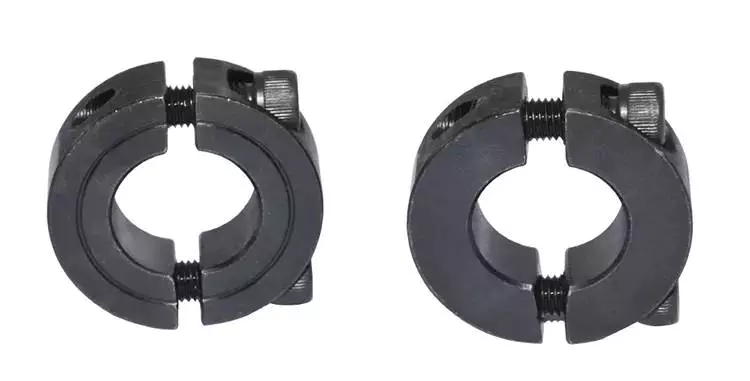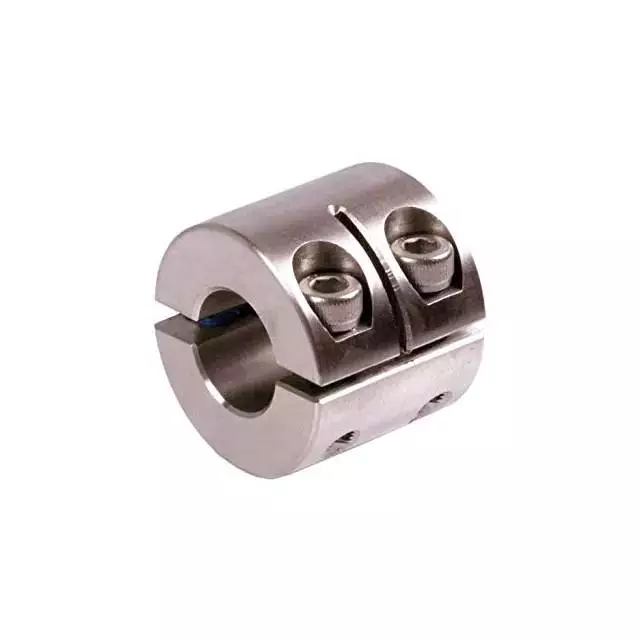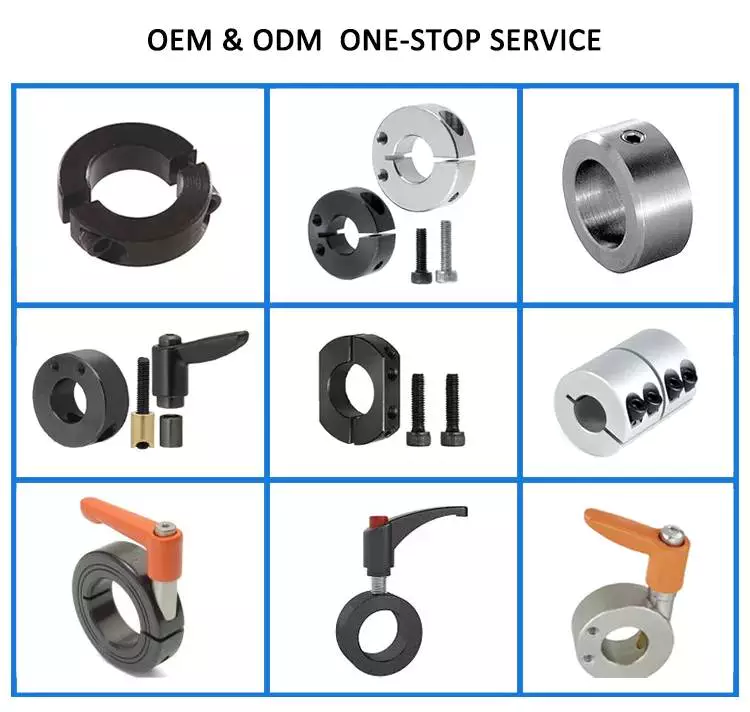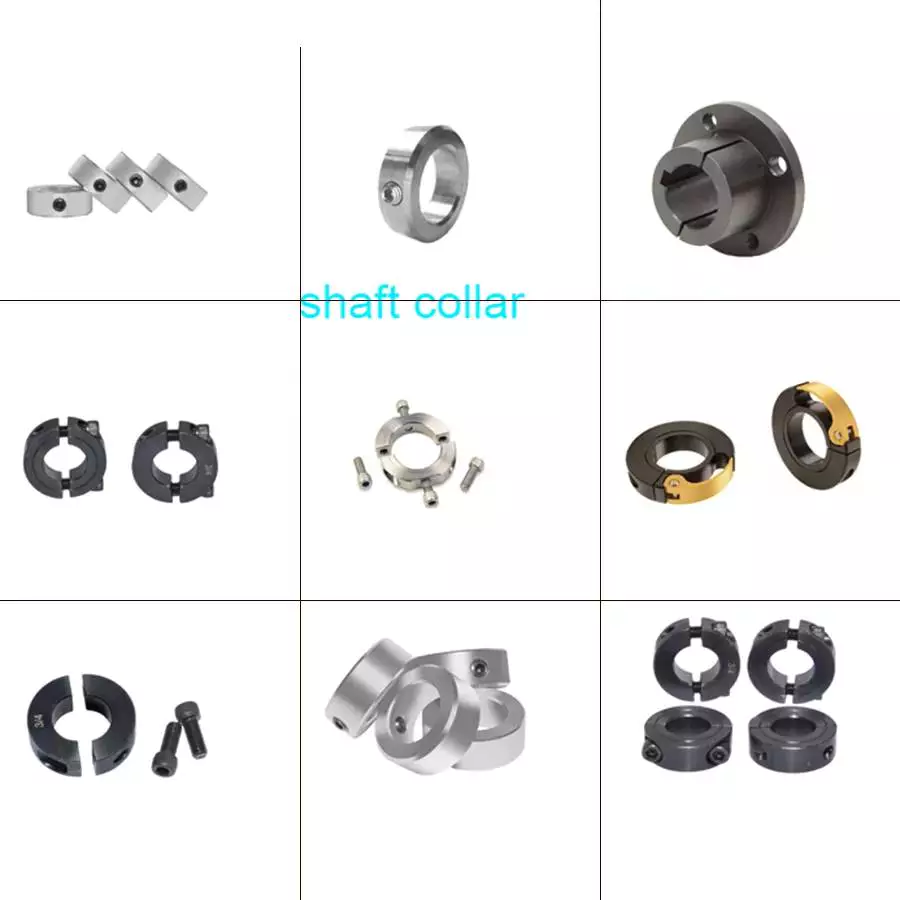Product Description
Custom outdoor sports parts manufacturing CNC Metal precision machining Aluminum collar adapter
Click here and specify your inquiry, contact us to get an online quote now!
How to get a quote?
1. First: Email us and offer your 3D drawing/2D drawing to us to quote.
2. Second: Let us know the required material, surface finish and special tolerance requirements, quantity information, we’ll arrange for our engineer to review your drawings and quote soon!
Note: Workable 3D Drawing Formats: STEP/IGS/X_T/STL/SOLIDWORKS etc, 2D Drawing with PDF will do.
Project Support: Free Sample Offered Before Production starts
Examples projects
What we can offer
| Advantages | »Free sample offered before production »Good machining quality and warm service »Reasonable Pricing and outstanding quality provided »Competitive shipping cost service with discount sometimes »MOQ 1PCS and small quantity order accepted, mass production supported »Professional engineering service when any modification required »Any turnkey assembly or customized package requirements, we’ll meet your demands! |
|||||
| Equipment |
»20 sets of CNC turning machines; »30 sets of the most technologically advanced machining CNC milling machines; »25 sets of Multi-Spindle Japan Precision Swiss CNC lathes |
|||||
| RFQ | Customer Inquiry →Engineering Communication →Cost Analysis →Sales Analysis →Quote to Customer » 1-3 Work Days Only » Submit RFQ with complete commercial terms |
|||||
| Sample Making | Sample Order → Engineering Review → Sample Plan to Customer → Sample Status Tracking → Submit Samples with Doc. » Sample L/T: 1 week » Continuous Sample Status Tracking » Complete Documents for sample approval |
|||||
| Order Management | CRM System → Open Order Confirm → Logistic Arrangement. » Production L/T: 2-4 wks » Weekly Open Order Confirm » Preferred 3PL Service to Customers |
|||||
| Quality Control | Certificates: RoHS, ISO9001:2008, SGS. IQC → IPQC → OQC/FQC → Quality Complain Feedback → Audit & Training. » Plant Audit and Qualified by world famous company » Strict Quality Management Procedure with Traceability |
|||||
| Application | »Aerospace »Automotive »Lighting fittings »Motorbike »PhotoGear »EDC Tools » Marine »Office equipment »Home appliance »Medical equipment »Telecommunication »Electrical & Electronics »Fire detection system, etc. |
|||||
Production information
1). Material Capabilities: Following GB, DIN, and ISO and applying good quality homemade and import materials, we have already provided single/assembly products for international customers mainly from the USA and Europe, etc.
| Stainless Steel | SS201, SS301, SS303, SS304, SS316, SS416 etc. |
| Steel | Mild steel, Carbon steel, 4140, 4340, Q235, Q345B, 20#, 45#, etc. |
| Brass | HPb63, HPb62, HPb61, HPb59, H59, H62, H68, H80 etc. |
| Copper | C11000, C12000, C12000 C36000 etc. |
| Aluminum | AL6061, Al6063, AL6082, AL7075, AL5052, A380 etc. |
| Iron | A36, 45#, 1213, 12L14, 1215 etc. |
| Plastic | ABS, PC, PE, POM, Delrin, Nylon, PP, PEI, Peek etc. |
2). Quality control:
*We have specialized QC testers to check the quality of the products according to different customers’ requirements. Usually, it’s a random inspection, and we also offer 100% inspection at a reasonable price if required.
*We have IQC to check the dimensions and surface of the incoming material
*We have PQC to inspect full-course during the manufacturing processing
*We have FQC to inspect all the anodizing/plating and other finishes’ products from our supplier and proceed with the professional quality and appearance inspection before shipping.
3).Surface Finish: sandblasted/normal and hard anodized finish/polish/coating/polish/passivation/plating/brush/heat treatment/fine glass beads/grounding/tumbled finish , etc. More detailed information for different material parts is below,
|
Aluminum parts |
Brushing Polishing Clear Anodized Color Anodized Sandblast Anodized Chemical Film |
| Stainless Steel parts | Polishing Passivated Sandblasting Plating |
| Steel Parts | Zinc plating Oxide Black Nickel plating Chrome plating Carburized Heat treatment Powder Coated |
| Plastic Parts | Chrome plating Polishing |
4). Payment terms: T/T payment. The Sample order is paid by full payment; Mass production with order amount exceeding can be paid a 50% deposit before production, and balance paid before shipping.
5). Production schedule: Usually, it takes 5~10 working days for sample production; 15~20 working days for mass production days, it depends on your design, simple parts can be produced quickly, the complicated design parts would take us more machining time.
6). Machining capability: 30 sets of the most technologically advanced machining CNC milling machines, 20 sets of CNC turning machines, 25 sets of Multi-Spindle Japan Precision Swiss CNC lathes, and 4 sets of 2D &3D CMM (image measuring instrument) quality control equipment 3 QC staff, enabling CNC Manufacturing to deliver precise parts within the tightest of tolerances, ensuring the highest quality results to meet different
customers’ requirements.
7). Tolerance: +/- 0.02mm (for Metal shaft), +/-0.03mm ( for plastic), for special tolerance requirements, please point them out in the email, we will Check if it’s feasible to make it after studying it.
8). Packing & Shipping way:
1. Packing Detail: Each product is packed with plastic preservative, EPE, foam plastic bag, Carton outside, wood case or iron case or as per the customer’s special requirement. Besides, the custom package takes a week to prepare in advance.
2. Delivery Detail: the fast International Shipping time takes 3 ~5 working days by DHL/UPS/FedEx, slow shipping time takes 7~ 8 working days by DHL/UPS/FedEx/TNT, etc.
3. Shipping options:
1) 0-100kg: express&air freight priority,
2) >100kg: sea freight priority,
3) As per customized specifications
About us
Full-service precision CNC machining services for prototypes and short and low to high production runs. Capabilities are CNC milled and turned metal parts and assemblies. Materials worked with include aluminum, brass, copper, stainless, steel, iron, other precious metals, and other plastic materials. Lead times are 2 to 3 weeks for prototypes and 4 to 6 weeks for production runs. Emergency and rush services are available. Industries served include aircraft and aerospace, consumer electronics, automotive, machinery fittings, audio equipment, EDC tools, computer, and Secondary processes such as anodizing, sandblasting, blackening, grinding, honing, heat treating, powder coating, passivation, polishing, plating, and brushing are also provided.
We put high attention and effort into all of the work that we do. Every part that comes off our machines is an extension of us. We take great pride in bringing machining CZPT to our customers. The amazing quality parts we machined here will be your best choice to find a supplier!
Customer’s comment
Want to know more about us? Email us now!
/* January 22, 2571 19:08:37 */!function(){function s(e,r){var a,o={};try{e&&e.split(“,”).forEach(function(e,t){e&&(a=e.match(/(.*?):(.*)$/))&&1
| After-sales Service: | Email Us Anytime If Any Problems |
|---|---|
| Warranty: | Email Us Anytime If Any Requirements |
| Condition: | New |
| Certification: | CE, RoHS, GS, ISO9001 |
| Standard: | DIN, CE, RoHS, GS, ISO9001 |
| Customized: | Customized |
| Samples: |
US$ 200/Piece
1 Piece(Min.Order) | |
|---|
| Customization: |
Available
| Customized Request |
|---|
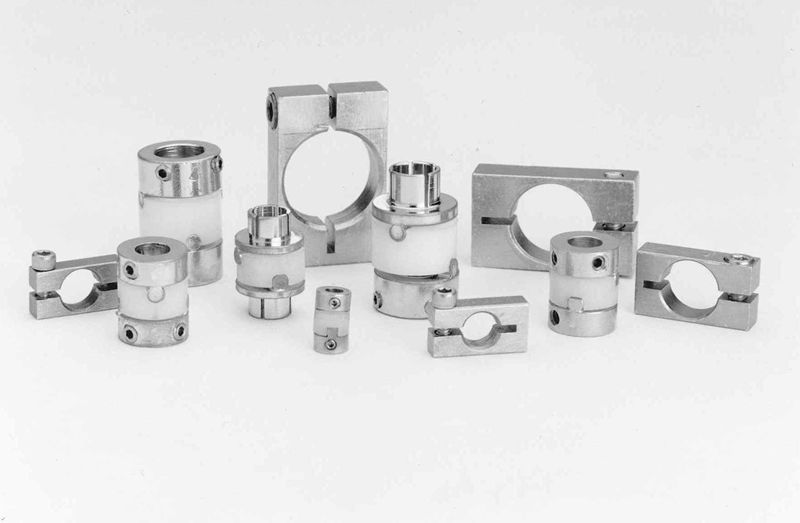
Can I find information on the application of aluminum collars in aerospace engineering?
Absolutely, you can find valuable information on the application of aluminum collars in aerospace engineering. These resources provide insights into how aluminum collars are used in the aerospace industry:
- 1. Aerospace Industry Publications: Explore publications specific to the aerospace industry. Magazines, journals, and websites often feature articles, case studies, and research papers on the use of aluminum collars in aerospace applications.
- 2. Aerospace Engineering Textbooks: Look for aerospace engineering textbooks that cover mechanical components and fastening methods. These books may include sections on collar applications in aerospace systems.
- 3. Manufacturer’s Aerospace Catalogs: Aerospace collar manufacturers often produce specialized catalogs or documentation focusing on their products’ suitability for aerospace engineering. These resources offer in-depth information on collar types, materials, and compliance with industry standards.
- 4. Aerospace Forums and Communities: Online forums and communities dedicated to aerospace engineering may have discussions and information on the use of collars in various aerospace systems. You can engage with professionals and enthusiasts in these forums.
- 5. Aerospace Trade Shows: Attend aerospace-related trade shows and exhibitions. These events showcase the latest advancements in aerospace technology and components, including aluminum collars used in various applications.
- 6. Aerospace Industry Associations: Explore industry-specific associations and organizations related to aerospace engineering. They often provide resources, publications, and guidelines related to mechanical components like collars.
- 7. Academic Institutions: Aerospace engineering departments at universities and research institutions may publish studies and resources related to collar applications in aerospace. Accessing academic publications can provide technical insights.
- 8. Collaboration with Aerospace Engineers: Connect with aerospace engineers and professionals who have hands-on experience in aerospace projects. They can share their knowledge and experiences with collar applications in the field.
- 9. Supplier Documentation: Contact collar suppliers or manufacturers and inquire about their aerospace-related documentation. They may provide technical data sheets, application notes, and compliance information relevant to aerospace use.
- 10. Online Search Engines: Utilize search engines to find articles, reports, and resources related to aluminum collar applications in aerospace engineering. Refine your search with specific keywords for more focused results.
By exploring these resources, you can gain valuable insights into the application of aluminum collars in aerospace engineering, whether you are involved in aerospace projects or simply interested in learning more about this field.
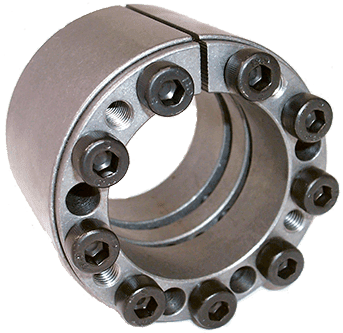
What are the design considerations when utilizing aluminum collars in machinery?
When designing machinery that incorporates aluminum collars, several considerations are vital to ensure optimal performance and safety. Here are the key design considerations:
- 1. Shaft Compatibility: Ensure that the aluminum collar’s inner diameter matches the shaft’s outer diameter. The fit should be snug without play to prevent slippage or misalignment.
- 2. Material Selection: Choose the right aluminum alloy for your collars based on the application. Different aluminum alloys offer varying properties, including strength, corrosion resistance, and weight. Select the alloy that best suits your machinery’s needs.
- 3. Collar Type: Determine the appropriate collar type based on your application. Set screw collars, clamping collars, or other variations provide different levels of clamping force and ease of installation. Select the type that aligns with your machinery’s requirements.
- 4. Environmental Factors: Consider the environment in which the machinery will operate. Aluminum collars are corrosion-resistant to some extent, but if exposed to harsh chemicals, moisture, or saltwater, you may need additional corrosion protection or alternative materials.
- 5. Weight Considerations: Take into account the machinery’s weight constraints. Aluminum collars are lightweight, making them suitable for applications where reducing weight is essential for performance and energy efficiency.
- 6. Precision and Tolerance: Maintain precision in collar dimensions and tolerances. Even small deviations in collar specifications can affect machinery performance. Quality control in manufacturing is crucial.
- Surface Finish: Ensure that the shaft and collar surfaces have the appropriate finish. A smooth surface finish reduces friction and wear. Consider surface treatments or coatings if needed.
- Clamping Force: Calculate and design for the required clamping force. This involves understanding the loads and stresses the collar will experience during operation. Overloading can lead to collar failure, so proper calculations are essential.
- Machining and Installation: Design the collar for ease of machining and installation. The collar should be straightforward to assemble, and it should not require specialized tools or complex procedures for installation.
- Alignment and Balance: Ensure that the collar is aligned with other components and balanced to prevent uneven stress or vibration issues. Misalignment can lead to wear and operational problems.
- Maintenance Accessibility: Consider how easily the collar can be accessed for maintenance. Machinery that requires frequent adjustments or inspections should have accessible collars for easy servicing.
By carefully addressing these design considerations, you can effectively integrate aluminum collars into your machinery, ensuring that they contribute to its performance, durability, and reliability.
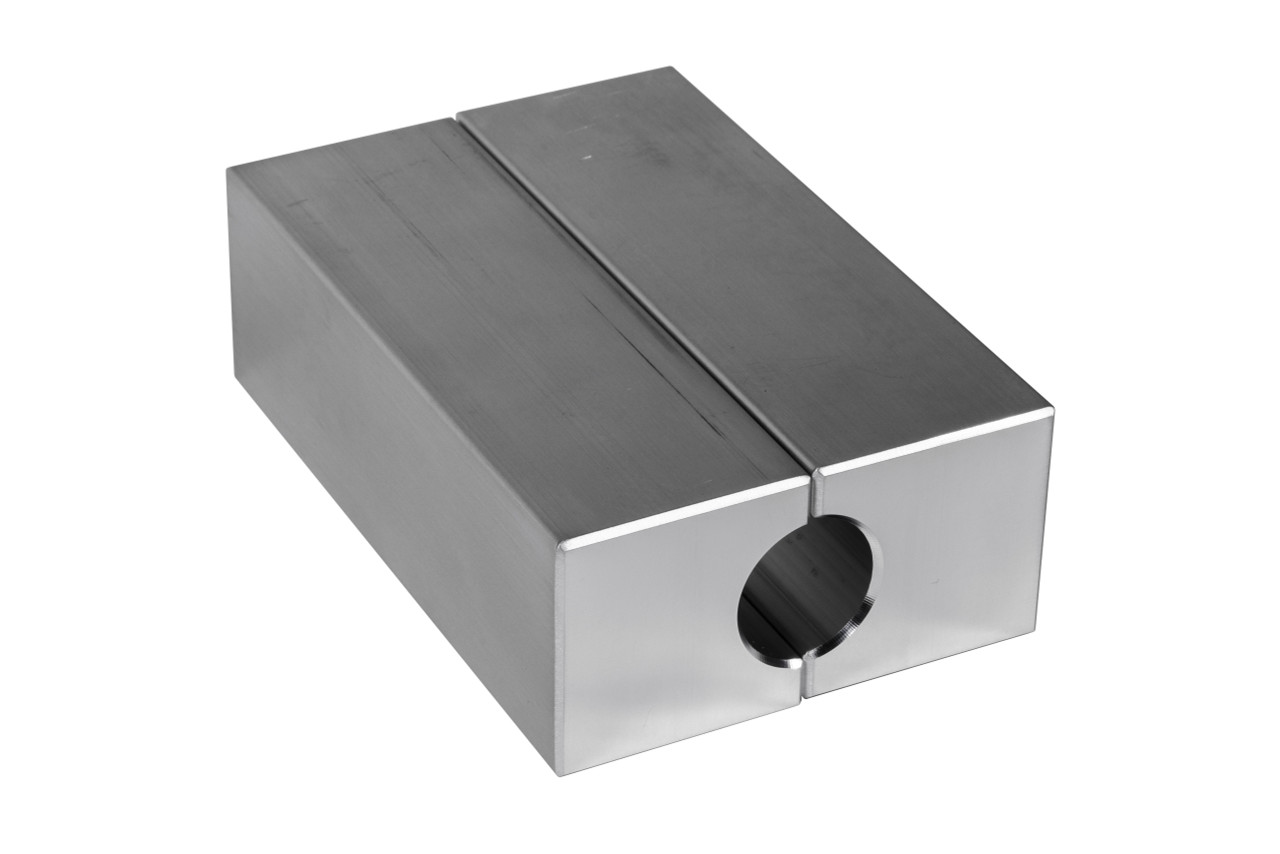
Are there reviews available for popular brands of aluminum collars for user feedback?
Yes, user reviews and feedback for popular brands of aluminum collars can be valuable resources when making purchasing decisions. Here’s where you can find reviews and feedback for aluminum collar brands:
- 1. Online Retailers: Websites of online retailers like Amazon, eBay, and industrial supply stores often feature user reviews and ratings for a wide range of products, including aluminum collars. These reviews are provided by customers who have purchased and used the products.
- 2. Manufacturer Websites: Some manufacturers maintain websites or product pages where users can leave reviews and feedback on their products. This can be a reliable source of information as it allows users to share their experiences directly with the manufacturer.
- 3. Industrial Forums: Online forums and communities dedicated to mechanical components and industrial equipment often have sections where users discuss and review products. These discussions can provide insights into the experiences of professionals in the field.
- 4. Industry-specific Publications: Trade magazines, journals, and industry-specific publications may include product reviews and recommendations. These sources are often written by experts and can be a trusted reference for industrial products like aluminum collars.
- 5. Social Media and LinkedIn Groups: Professional social media platforms, such as LinkedIn, have groups and communities related to industrial and mechanical engineering. Users in these groups may share their experiences and opinions on various products, including aluminum collars.
- 6. Company Case Studies: Some companies provide case studies or success stories on their websites that highlight how their products, including collars, have been used in real-world applications. These can offer valuable insights into product performance.
When reading reviews and feedback, it’s important to consider multiple sources and weigh the overall sentiment. Look for common themes in the reviews and pay attention to factors that are most relevant to your specific application. Keep in mind that individual experiences may vary, so a well-rounded understanding is key when evaluating the quality and suitability of aluminum collar brands.


editor by Dream 2024-05-14
China high quality Metal Buckle Strong Aluminium Alloy Dog Collar eccentric collar shaft lock
Product Description
Product Description
Product Description
Metal Buckle Dog Collar
This new design dog collar made with laminated print webbing, with Zinc alloy kit buckle instead of plastic buckle, Zinc alloy D-ring and slider make our Dog collar Anti-rust ,stronger and unique
If you are searching for a strong dog collar that can be make you and your dog feeling comfortable, this product will fit you the best. Our E-store offers the wide range of dog collar that will serve you and your four-legged friend for a long period of time. High quality zinc alloy snap hook will serve you for a long time, we offer 12 months product warranty
Different sizes for your reference and it’s customized
Please kindly note that all the measurements are made by hand, there are will be a difference of 1-2cm,please subject to the actual sample.
| Size | Webbing Width | Length |
| S | 2.0cm | 28-38cm |
| M | 2.5cm | 38-50cm |
| L | 2.5cm | 46-64cm |
| Product Name | Print Dog Collar |
| Type |
Pet Collar |
| Material |
Polyester,Aluminium Alloy |
| Feature |
Laminated Print, Length Adjustable |
| Application |
Dog |
| Season |
All Season |
| Style |
Sports |
| Place pf Origin |
China |
| Brand Name |
Bettering |
| Size |
S:2.0*28-38cm/M:2.5*38-48cm/L:2.5*46-61cm (unit:cm) |
Metal Buckle Dog Colalr
More Colors for your distinctive favour, make your dog outstanding out of others
/* January 22, 2571 19:08:37 */!function(){function s(e,r){var a,o={};try{e&&e.split(“,”).forEach(function(e,t){e&&(a=e.match(/(.*?):(.*)$/))&&1
| Suitable for: | Dog |
|---|---|
| Material: | Nylon |
| Type: | Buckle Collars |
| Samples: |
US$ 20/Piece
1 Piece(Min.Order) | Order Sample |
|---|
| Customization: |
Available
| Customized Request |
|---|
.shipping-cost-tm .tm-status-off{background: none;padding:0;color: #1470cc}
|
Shipping Cost:
Estimated freight per unit. |
about shipping cost and estimated delivery time. |
|---|
| Payment Method: |
|
|---|---|
|
Initial Payment Full Payment |
| Currency: | US$ |
|---|
| Return&refunds: | You can apply for a refund up to 30 days after receipt of the products. |
|---|
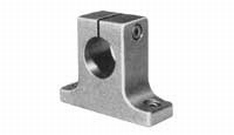
What are the steps for replacing existing collars with aluminum collars in industrial settings?
Replacing existing collars with aluminum collars in industrial settings can be a beneficial upgrade. Here are the steps to follow for a successful replacement:
- 1. Safety Precautions: Before beginning any work, prioritize safety. Ensure the machinery is powered off, and proper lockout/tagout procedures are followed to prevent accidental startup. Wear appropriate safety gear.
- 2. Assessment: Evaluate the condition of the existing collars and the reasons for replacement. Identify any wear and damage that necessitates the change.
- 3. Identify Collar Type: Determine the specific type of aluminum collars that will replace the existing ones. Consider factors like shaft size, collar type (e.g., set screw, clamping, or split collar), and material requirements.
- 4. Gather Tools: Collect the necessary tools and equipment for the replacement process, including wrenches, screwdrivers, and any specialized tools required for the chosen collar type.
- 5. Remove Existing Collars: Carefully disassemble and remove the existing collars from the shafts. Loosen any set screws and detach the collars while ensuring minimal disturbance to the machinery’s alignment.
- 6. Clean and Inspect: Clean the shaft and the surrounding area to remove any debris, rust, or residue. Inspect the shaft for any damage that may affect the performance of the new collars.
- 7. Lubrication: Apply a suitable lubricant to the shaft to reduce friction and aid in the installation of the new aluminum collars. Ensure that the lubricant is compatible with aluminum and the application’s environment.
- 8. Install Aluminum Collars: Slide the new aluminum collars onto the shaft at the desired positions. Follow the manufacturer’s guidelines for installation, whether it involves set screws, clamping mechanisms, or split collar assembly. Tighten the collars securely to the manufacturer’s recommended torque specifications.
- 9. Alignment: Check the alignment of the new collars and ensure they are correctly positioned. Misalignment can lead to operational issues and wear. Make adjustments if necessary.
- 10. Quality Control: Perform quality checks to ensure that the aluminum collars are securely in place and that the machinery operates smoothly. Test the machinery to verify its performance.
- 11. Record Keeping: Maintain records of the replacement process, including the date of replacement, collar specifications, and any adjustments made. This documentation can be valuable for future maintenance and troubleshooting.
- 12. Maintenance Plan: Implement a maintenance plan for the new aluminum collars, including regular inspections and lubrication. This will help extend their service life and ensure optimal performance.
Replacing existing collars with aluminum collars can improve the efficiency and reliability of industrial machinery. Proper installation and maintenance are key to the success of this upgrade.
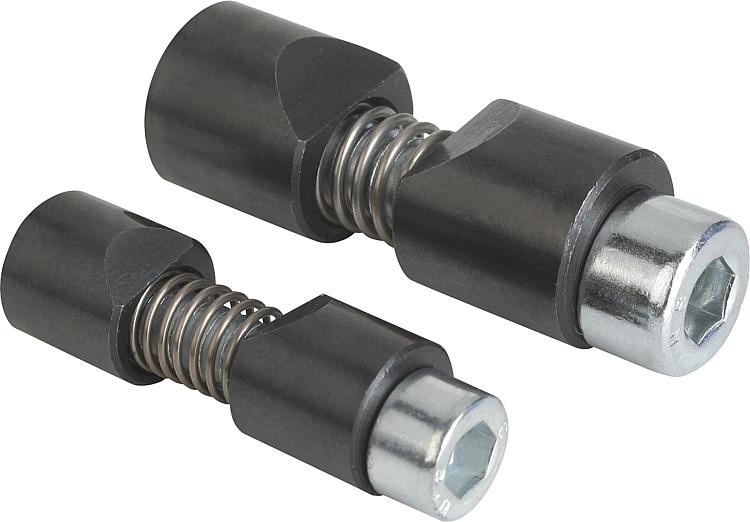
Where can I find tutorials on the correct installation of aluminum collars?
Installing aluminum collars correctly is essential to ensure their effectiveness in mechanical applications. You can find tutorials and guides on the correct installation of aluminum collars through the following sources:
- 1. Manufacturer’s Documentation: Start by checking the official website of the aluminum collar manufacturer. Many manufacturers provide detailed installation guides, instructions, and videos specific to their products.
- 2. YouTube and Video Platforms: Video-sharing platforms like YouTube often host instructional videos on various mechanical components, including collars. Search for videos related to “aluminum collar installation” to find visual tutorials.
- 3. Online Mechanical Forums: Online mechanical forums and communities, such as engineering.stackexchange.com or practicalmachinist.com, may have discussions and threads where experienced users share installation tips and techniques.
- 4. Mechanical Engineering Resources: Academic websites and resources from mechanical engineering institutions may offer guidance on collar installation as part of their educational content.
- 5. Industrial Supply Websites: Websites of industrial supply stores and suppliers often provide resources on product usage. Look for downloadable guides or articles related to collar installation.
- 6. Books and Publications: Mechanical engineering books and publications often include sections on the installation of mechanical components. Consider looking for relevant books in your field of interest.
- 7. Manufacturer’s Customer Support: Contact the manufacturer’s customer support for assistance and guidance. They can provide information, answer questions, and offer specific advice for your collar installation needs.
- 8. In-Person Workshops and Training: Some manufacturers or technical schools offer in-person workshops or training sessions on mechanical component installation, including collars. Check for local training opportunities in your area.
- 9. Professional Organizations: Mechanical engineering and industry-specific professional organizations may have resources, webinars, or seminars on proper installation techniques. Consider joining relevant organizations to access such materials.
When using tutorials for collar installation, ensure that the source is reputable and that the information is up-to-date. Follow the manufacturer’s guidelines closely, and seek expert assistance if you encounter challenges or have specific questions about your installation process. Proper installation is essential to maximize the performance and safety of your mechanical system.

What are the key differences between aluminum collars and other collar materials like stainless steel?
Understanding the differences between aluminum collars and other materials like stainless steel is essential when selecting the right collar for your application. Here are the key distinctions:
| Characteristic | Aluminum Collars | Stainless Steel Collars |
|---|---|---|
| Weight | Aluminum collars are lightweight, making them ideal for applications where weight reduction is crucial. | Stainless steel collars are heavier than aluminum collars, which can be advantageous in some high-stress applications. |
| Corrosion Resistance | Aluminum has natural corrosion resistance due to its oxide layer. It’s suitable for indoor and outdoor applications but may not be ideal for highly corrosive environments. | Stainless steel is known for its excellent corrosion resistance, making it suitable for a wide range of applications, including those exposed to harsh chemicals and saltwater. |
| Machinability | Aluminum is relatively easy to machine, making it suitable for custom collar designs. Machining and fabricating aluminum collars is straightforward. | Stainless steel can be more challenging to machine due to its hardness, but it’s still machinable. Special tools and expertise may be required. |
| Strength | Aluminum collars are less strong than stainless steel collars. They are suitable for applications where high strength is not a primary requirement. | Stainless steel collars offer higher strength and durability, making them suitable for high-stress and heavy-load applications. |
| Magnetic Properties | Aluminum is non-magnetic, making it ideal for applications where magnetic interference is a concern. | Stainless steel can be magnetic or non-magnetic, depending on its composition. This property should be considered in applications sensitive to magnetic fields. |
| Cost | Aluminum collars are generally more cost-effective than stainless steel collars, making them a budget-friendly choice. | Stainless steel collars are often more expensive due to their higher material cost and manufacturing complexity. |
The choice between aluminum and stainless steel collars depends on the specific requirements of your application. Consider factors such as weight, corrosion resistance, strength, and budget constraints when making your selection. It’s essential to select the material that best aligns with the needs of your mechanical application.


editor by Dream 2024-05-09
China OEM Shenzhen CNC Turning Machined Custom Made Metal Aluminum Iron Stainless Steel Titanium Collar Manufacturing 3/4 shaft collar
Product Description
HangZhou CNC turning machined custom made metal aluminum iron stainless steel titanium collar manufacturing
Click here and specify your inquiry, contact us to get an online quote now!
How to get a quote?
1. First: Email us and offer your 3D drawing/2D drawing to us to quote.
2. Second: Let us know the required material, surface finish and special tolerance requirements, quantity information, we’ll arrange for our engineer to review your drawings and quote soon!
Note: Workable 3D Drawing Formats: STEP/IGS/X_T/STL/SOLIDWORKS etc, 2D Drawing with PDF will do.
Project Support: Free Sample Offered Before Production starts, and NDA file could be signed to protect your product privacy if you need.
Examples projects
What we can offer
| Advantages | »Free sample offered before production »Good machining quality and warm service »Reasonable Pricing and outstanding quality provided »Competitive shipping cost service with discount sometimes »MOQ 1PCS and small quantity order accepted, mass production supported »Professional engineering service when any modification required »Any turnkey assembly or customized package requirements, we’ll meet your demands! |
|||||
| Equipment |
»20 sets of CNC turning machines; »30 sets of the most technologically advanced machining CNC milling machines; »25 sets of Multi-Spindle Japan Precision Swiss CNC lathes |
|||||
| RFQ | Customer Inquiry →Engineering Communication →Cost Analysis →Sales Analysis →Quote to Customer » 1-3 Work Days Only » Submit RFQ with complete commercial terms |
|||||
| Sample Making | Sample Order → Engineering Review → Sample Plan to Customer → Sample Status Tracking → Submit Samples with Doc. » Sample L/T: 1 week » Continuous Sample Status Tracking » Complete Documents for sample approval |
|||||
| Order Management | CRM System → Open Order Confirm → Logistic Arrangement. » Production L/T: 2-4 wks » Weekly Open Order Confirm » Preferred 3PL Service to Customers |
|||||
| Quality Control | Certificates: RoHS, ISO9001:2008, SGS. IQC → IPQC → OQC/FQC → Quality Complain Feedback → Audit & Training. » Plant Audit and Qualified by world famous company » Strict Quality Management Procedure with Traceability |
|||||
| Application | »Aerospace »Automotive »Lighting fittings »Motorbike »PhotoGear »EDC Tools » Marine »Office equipment »Home appliance »Medical equipment »Telecommunication »Electrical & Electronics »Fire detection system, etc. |
|||||
Production information
1). Material Capabilities: Following GB, DIN, and ISO and applying good quality homemade and import materials, we have already provided single/assembly products for international customers mainly from the USA and Europe, etc.
| Stainless Steel | SS201, SS301, SS303, SS304, SS316, SS416 etc. |
| Steel | Mild steel, Carbon steel, 4140, 4340, Q235, Q345B, 20#, 45#, etc. |
| Brass | HPb63, HPb62, HPb61, HPb59, H59, H62, H68, H80 etc. |
| Copper | C11000, C12000, C12000 C36000 etc. |
| Aluminum | AL6061, Al6063, AL6082, AL7075, AL5052, A380 etc. |
| Iron | A36, 45#, 1213, 12L14, 1215 etc. |
| Plastic | ABS, PC, PE, POM, Delrin, Nylon, PP, PEI, Peek etc. |
2). Quality control:
*We have specialized QC testers to check the quality of the products according to different customers’ requirements. Usually, it’s a random inspection, and we also offer 100% inspection at a reasonable price if required.
*We have IQC to check the dimensions and surface of the incoming material
*We have PQC to inspect full-course during the manufacturing processing
*We have FQC to inspect all the anodizing/plating and other finishes’ products from our supplier and proceed with the professional quality and appearance inspection before shipping.
3).Surface Finish: sandblasted/normal and hard anodized finish/polish/coating/polish/passivation/plating/brush/heat treatment/fine glass beads/grounding/tumbled finish , etc. More detailed information for different material parts is below,
|
Aluminum parts |
Brushing Polishing Clear Anodized Color Anodized Sandblast Anodized Chemical Film |
| Stainless Steel parts | Polishing Passivated Sandblasting Plating |
| Steel Parts | Zinc plating Oxide Black Nickel plating Chrome plating Carburized Heat treatment Powder Coated |
| Plastic Parts | Chrome plating Polishing |
4). Payment terms: T/T payment. The Sample order is paid by full payment; Mass production with order amount exceeding can be paid a 50% deposit before production, and balance paid before shipping.
5). Production schedule: Usually, it takes 5~10 working days for sample production; 15~20 working days for mass production days, it depends on your design, simple parts can be produced quickly, the complicated design parts would take us more machining time.
6). Machining capability: 30 sets of the most technologically advanced machining CNC milling machines, 20 sets of CNC turning machines, 25 sets of Multi-Spindle Japan Precision Swiss CNC lathes, and 4 sets of 2D &3D CMM (image measuring instrument) quality control equipment 3 QC staff, enabling CNC Manufacturing to deliver precise parts within the tightest of tolerances, ensuring the highest quality results to meet different
customers’ requirements.
7). Tolerance: +/- 0.02mm (for Metal shaft), +/-0.03mm ( for plastic), for special tolerance requirements, please point them out in the email, we will Check if it’s feasible to make it after studying it.
8). Packing & Shipping way:
1. Packing Detail: Each product is packed with plastic preservative, EPE, foam plastic bag, Carton outside, wood case or iron case or as per the customer’s special requirement. Besides, the custom package takes a week to prepare in advance.
2. Delivery Detail: the fast International Shipping time takes 3 ~5 working days by DHL/UPS/FedEx, slow shipping time takes 7~ 8 working days by DHL/UPS/FedEx/TNT, etc.
3. Shipping options:
1) 0-100kg: express&air freight priority,
2) >100kg: sea freight priority,
3) As per customized specifications
About us
Full-service precision CNC machining services for prototypes and short and low to high production runs. Capabilities are CNC milled and turned metal parts and assemblies, with 100~150 employees and 50 sets of CNC turning machines and CNC milling machines working for the custom manufacturing project. Materials worked with include aluminum, brass, copper, stainless, steel, iron, other precious metals, and other plastic materials. Lead times are 1 to 2 weeks for prototypes and 2 to 3 weeks for production runs. Emergency and rush services are available.
Industries served include aircraft and aerospace, consumer electronics, automotive, machinery fittings, audio equipment, EDC tools, computer, and Secondary processes such as anodizing, sandblasting, blackening, grinding, honing, heat treating, powder coating, passivation, polishing, plating, and brushing are also provided. NDA file could be signed to protect your product privacy if you need.
We put high attention and effort into all of the work that we do. Every part that comes off our machines is an extension of us. We take great pride in bringing machining CZPT to our customers. The amazing quality parts we machined here will be your best choice to find a supplier
Customer’s comment
Want to know more about us? Email us now!
/* January 22, 2571 19:08:37 */!function(){function s(e,r){var a,o={};try{e&&e.split(“,”).forEach(function(e,t){e&&(a=e.match(/(.*?):(.*)$/))&&1
| After-sales Service: | Free Samples Provided Before Production |
|---|---|
| Warranty: | 2 Years |
| Condition: | New |
| Certification: | CE, RoHS, GS, ISO9001 |
| Standard: | DIN, Custom Metal Parts & Free Sample Offered |
| Customized: | Customized |
| Samples: |
US$ 150/Piece
1 Piece(Min.Order) | |
|---|
| Customization: |
Available
| Customized Request |
|---|

Can I find information on the application of aluminum collars in aerospace engineering?
Absolutely, you can find valuable information on the application of aluminum collars in aerospace engineering. These resources provide insights into how aluminum collars are used in the aerospace industry:
- 1. Aerospace Industry Publications: Explore publications specific to the aerospace industry. Magazines, journals, and websites often feature articles, case studies, and research papers on the use of aluminum collars in aerospace applications.
- 2. Aerospace Engineering Textbooks: Look for aerospace engineering textbooks that cover mechanical components and fastening methods. These books may include sections on collar applications in aerospace systems.
- 3. Manufacturer’s Aerospace Catalogs: Aerospace collar manufacturers often produce specialized catalogs or documentation focusing on their products’ suitability for aerospace engineering. These resources offer in-depth information on collar types, materials, and compliance with industry standards.
- 4. Aerospace Forums and Communities: Online forums and communities dedicated to aerospace engineering may have discussions and information on the use of collars in various aerospace systems. You can engage with professionals and enthusiasts in these forums.
- 5. Aerospace Trade Shows: Attend aerospace-related trade shows and exhibitions. These events showcase the latest advancements in aerospace technology and components, including aluminum collars used in various applications.
- 6. Aerospace Industry Associations: Explore industry-specific associations and organizations related to aerospace engineering. They often provide resources, publications, and guidelines related to mechanical components like collars.
- 7. Academic Institutions: Aerospace engineering departments at universities and research institutions may publish studies and resources related to collar applications in aerospace. Accessing academic publications can provide technical insights.
- 8. Collaboration with Aerospace Engineers: Connect with aerospace engineers and professionals who have hands-on experience in aerospace projects. They can share their knowledge and experiences with collar applications in the field.
- 9. Supplier Documentation: Contact collar suppliers or manufacturers and inquire about their aerospace-related documentation. They may provide technical data sheets, application notes, and compliance information relevant to aerospace use.
- 10. Online Search Engines: Utilize search engines to find articles, reports, and resources related to aluminum collar applications in aerospace engineering. Refine your search with specific keywords for more focused results.
By exploring these resources, you can gain valuable insights into the application of aluminum collars in aerospace engineering, whether you are involved in aerospace projects or simply interested in learning more about this field.

What are the design considerations when utilizing aluminum collars in machinery?
When designing machinery that incorporates aluminum collars, several considerations are vital to ensure optimal performance and safety. Here are the key design considerations:
- 1. Shaft Compatibility: Ensure that the aluminum collar’s inner diameter matches the shaft’s outer diameter. The fit should be snug without play to prevent slippage or misalignment.
- 2. Material Selection: Choose the right aluminum alloy for your collars based on the application. Different aluminum alloys offer varying properties, including strength, corrosion resistance, and weight. Select the alloy that best suits your machinery’s needs.
- 3. Collar Type: Determine the appropriate collar type based on your application. Set screw collars, clamping collars, or other variations provide different levels of clamping force and ease of installation. Select the type that aligns with your machinery’s requirements.
- 4. Environmental Factors: Consider the environment in which the machinery will operate. Aluminum collars are corrosion-resistant to some extent, but if exposed to harsh chemicals, moisture, or saltwater, you may need additional corrosion protection or alternative materials.
- 5. Weight Considerations: Take into account the machinery’s weight constraints. Aluminum collars are lightweight, making them suitable for applications where reducing weight is essential for performance and energy efficiency.
- 6. Precision and Tolerance: Maintain precision in collar dimensions and tolerances. Even small deviations in collar specifications can affect machinery performance. Quality control in manufacturing is crucial.
- Surface Finish: Ensure that the shaft and collar surfaces have the appropriate finish. A smooth surface finish reduces friction and wear. Consider surface treatments or coatings if needed.
- Clamping Force: Calculate and design for the required clamping force. This involves understanding the loads and stresses the collar will experience during operation. Overloading can lead to collar failure, so proper calculations are essential.
- Machining and Installation: Design the collar for ease of machining and installation. The collar should be straightforward to assemble, and it should not require specialized tools or complex procedures for installation.
- Alignment and Balance: Ensure that the collar is aligned with other components and balanced to prevent uneven stress or vibration issues. Misalignment can lead to wear and operational problems.
- Maintenance Accessibility: Consider how easily the collar can be accessed for maintenance. Machinery that requires frequent adjustments or inspections should have accessible collars for easy servicing.
By carefully addressing these design considerations, you can effectively integrate aluminum collars into your machinery, ensuring that they contribute to its performance, durability, and reliability.

What are the key differences between aluminum collars and other collar materials like stainless steel?
Understanding the differences between aluminum collars and other materials like stainless steel is essential when selecting the right collar for your application. Here are the key distinctions:
| Characteristic | Aluminum Collars | Stainless Steel Collars |
|---|---|---|
| Weight | Aluminum collars are lightweight, making them ideal for applications where weight reduction is crucial. | Stainless steel collars are heavier than aluminum collars, which can be advantageous in some high-stress applications. |
| Corrosion Resistance | Aluminum has natural corrosion resistance due to its oxide layer. It’s suitable for indoor and outdoor applications but may not be ideal for highly corrosive environments. | Stainless steel is known for its excellent corrosion resistance, making it suitable for a wide range of applications, including those exposed to harsh chemicals and saltwater. |
| Machinability | Aluminum is relatively easy to machine, making it suitable for custom collar designs. Machining and fabricating aluminum collars is straightforward. | Stainless steel can be more challenging to machine due to its hardness, but it’s still machinable. Special tools and expertise may be required. |
| Strength | Aluminum collars are less strong than stainless steel collars. They are suitable for applications where high strength is not a primary requirement. | Stainless steel collars offer higher strength and durability, making them suitable for high-stress and heavy-load applications. |
| Magnetic Properties | Aluminum is non-magnetic, making it ideal for applications where magnetic interference is a concern. | Stainless steel can be magnetic or non-magnetic, depending on its composition. This property should be considered in applications sensitive to magnetic fields. |
| Cost | Aluminum collars are generally more cost-effective than stainless steel collars, making them a budget-friendly choice. | Stainless steel collars are often more expensive due to their higher material cost and manufacturing complexity. |
The choice between aluminum and stainless steel collars depends on the specific requirements of your application. Consider factors such as weight, corrosion resistance, strength, and budget constraints when making your selection. It’s essential to select the material that best aligns with the needs of your mechanical application.


editor by Dream 2024-04-22
China factory Customized High Precision Aluminum Metal Standard Shaft Collar with Hot selling
Product Description
HangZhou CZPT CO.,LTD
QY Precision specializes in design and production of high precision metal parts and components. Focus on industry and action on demand, to be your trusted partner is our mission.
Our Advantages
About Us:
1. Focus on the customization of high-end zinc aluminum alloy die castings for Decades years
2. We are a one-stop manufacturer integrating mold design, product die-casting, and surface treatment
3. One-stop production, fast delivery, and the qualified rate of quality reaches 100%
4. One-stop production, from product mold design to product surface treatment, perfect quality control
5. Die-casting machines keep working 24 hours a day, with a daily output of 20W pieces, so we are capable of large quantity order
6. Strictly implement the national quality standards of the die-casting industry, strictly implement the ISO9001-2015 quality management system, and the products have passed ROHS certification
7. The quality is controllable, and the on-time delivery rate is 100% if there is no unstoppable disaster.
8. More than 5000+ die-casting mold customization experience, support customized processing with drawings and samples
Our Service:
1)OEM,Die Casting,CNC Machining,Surface Treatment
2) Own mould R&D team and mould making workshop.
3) Own factory to offer the reasonable prices and quick response.
4) One-to-One after sales services,answer question for customers 24 hours every day
5) Experienced project team,each product is tracked by a specially assigned person
Fast communication, Professional technology, Excellent product quality, Reasonable Price and Wonderful after-sale service.
Application of Custom Machined Parts:
All the parts from QY Precision are widely used in medical, electronic gadgets, electrical appliances, furniture, building, toys, motor cycles, racing cars, machine parts, kitchenware, sport equipment, music instruments, robots, machinery and many other fields.
Material Capability:
QY Precision Cooperates with domestic and foreign brand original manufacturers to optimize materials to ensure product quality and increase product life. At the same time, all materials can provide certification documents.
Surface Treatment from QY Precision:
Heat Treatment, Painting, Power Coating, Black Oxide, Silver/Gold plating, Electrolytic Polishing, Nitrided, Phosphating, Nickel/Zinc/Chrome/TiCN Plated, Anodizing, Polishing, Passivation, Sandblasting, Galvanizing, Heating Treatment, Harden, Laser mark etc. as customer requested.
CNC Processing Ability:
We have a large number of machines to meet Turning/Milling/Drilling/Stamping etc. different processing, such as CNC machining center 3-Axis, 4-Axis and 5-Axis, CNC lathe machine, CNC automatic lathe machine, Punching machine, grinder, precision internal/external grinding, wire cutting, spark machine, etc. The detection equipment: projector, altimeter, digital micrometer, digital caliper, quick gauge, plug gauge, internal/displacement gauge and other high-precision testing instruments, the detection accuracy up to 0.001mm.
| Services | CNC Milling, CNC Turning, Wire EDM Cutting, 3D Printing,Vacuum Casting,Reaction Injection Molding, Plastic CNC Machining, Laser, Cutting, Stamping Parts, Bending Parts |
| Material | Metal: Aluminum , Copper , Brass , Steel, Stainless Steel, Titanium and etc. |
| Plastic: ABS, POM, PP, PU, PC,PA66, PMMA, PVC, PVE, Nylon and etc. | |
| Surface treatment | Anodizing, Sandblasting, Metal Plating, Polishing, Painting, Powder coating, Brushing ,Silk-screen , Laser Engraving etc. |
| Heat treatment | Annealing, Normalizing , Nitriding, Tempering |
| File Formats | STP, STEP, IGS,STP,X_T ,DXF,DWG , Pro/E, PDF, SLDPRT |
| Inspection | In-house or third party, all the products are strictly inspected by skilled QC |
| Service Type | OEM & ODM Service |
Detailed Photos
Customized High Precision Aluminum Metal Standard Shaft Collar
Product Description
Specification:
| Services | CNC Milling, CNC Turning, Wire EDM Cutting, 3D Printing,Vacuum Casting,Reaction Injection Molding, Plastic CNC Machining, Laser, Cutting, Stamping Parts, Bending Parts |
| Material | Metal: Aluminum , Copper , Brass , Steel, Stainless Steel, Titanium and etc. |
| Plastic: ABS, POM, PP, PU, PC,PA66, PMMA, PVC, PVE, Nylon and etc. | |
| Surface treatment | Anodizing, Sandblasting, Metal Plating, Polishing, Painting, Powder coating, Brushing ,Silk-screen , Laser Engraving etc. |
| Heat treatment | Annealing, Normalizing , Nitriding, Tempering |
| File Formats | STP, STEP, IGS,STP,X_T ,DXF,DWG , Pro/E, PDF, SLDPRT |
| Inspection | In-house or third party, all the products are strictly inspected by skilled QC |
| Service Type | OEM & ODM Service |
Surface Finish:
Available Material:
FAQ
1.How to get a quote?
Kindly send us the drawing of your product,please. Including details as below: a.Materials b. Surface Finish c. Tolerance d. Quantity If you need solutions for your application, kindly send us your detail requirements, and we will have engineers to serve you.
2.How does the payment process work?
Payment terms are flexible for us. We can accept different type payment way, for example: T/T
3.How do I know about the production?
We will double confirm your requirements and send you the sample before the mass production as you required.
4.How do I know about the delivery?
Before shipment we will confirm with you about all the details including CI and other attention issues. After ship out, we will inform you of the tracking number and keep updating the latest shipping information for you.
5.What will you do for after sales?
We will follow up and await your feedback. Any question related to our metal parts, our experienced engineers are ready to help. And welcome to contact for any supporting of your other application even if their is no relationship with our products.
6. Are you manufacturer or trader?
Both trader and manufacturer. We have our own Machining factory, and also work with excellent factories to supply more process service to meet cutomers’ requirements.
Packaging & Shipping
| Type: | Fixed Collar |
|---|---|
| Supply: | Drawing Design |
| Item: | Machining Part |
| Samples: |
US$ 0/Piece
1 Piece(Min.Order) | Order Sample |
|---|
| Customization: |
Available
| Customized Request |
|---|
.shipping-cost-tm .tm-status-off{background: none;padding:0;color: #1470cc}
|
Shipping Cost:
Estimated freight per unit. |
about shipping cost and estimated delivery time. |
|---|
| Payment Method: |
|
|---|---|
|
Initial Payment Full Payment |
| Currency: | US$ |
|---|
| Return&refunds: | You can apply for a refund up to 30 days after receipt of the products. |
|---|

What are the steps for replacing existing collars with aluminum collars in industrial settings?
Replacing existing collars with aluminum collars in industrial settings can be a beneficial upgrade. Here are the steps to follow for a successful replacement:
- 1. Safety Precautions: Before beginning any work, prioritize safety. Ensure the machinery is powered off, and proper lockout/tagout procedures are followed to prevent accidental startup. Wear appropriate safety gear.
- 2. Assessment: Evaluate the condition of the existing collars and the reasons for replacement. Identify any wear and damage that necessitates the change.
- 3. Identify Collar Type: Determine the specific type of aluminum collars that will replace the existing ones. Consider factors like shaft size, collar type (e.g., set screw, clamping, or split collar), and material requirements.
- 4. Gather Tools: Collect the necessary tools and equipment for the replacement process, including wrenches, screwdrivers, and any specialized tools required for the chosen collar type.
- 5. Remove Existing Collars: Carefully disassemble and remove the existing collars from the shafts. Loosen any set screws and detach the collars while ensuring minimal disturbance to the machinery’s alignment.
- 6. Clean and Inspect: Clean the shaft and the surrounding area to remove any debris, rust, or residue. Inspect the shaft for any damage that may affect the performance of the new collars.
- 7. Lubrication: Apply a suitable lubricant to the shaft to reduce friction and aid in the installation of the new aluminum collars. Ensure that the lubricant is compatible with aluminum and the application’s environment.
- 8. Install Aluminum Collars: Slide the new aluminum collars onto the shaft at the desired positions. Follow the manufacturer’s guidelines for installation, whether it involves set screws, clamping mechanisms, or split collar assembly. Tighten the collars securely to the manufacturer’s recommended torque specifications.
- 9. Alignment: Check the alignment of the new collars and ensure they are correctly positioned. Misalignment can lead to operational issues and wear. Make adjustments if necessary.
- 10. Quality Control: Perform quality checks to ensure that the aluminum collars are securely in place and that the machinery operates smoothly. Test the machinery to verify its performance.
- 11. Record Keeping: Maintain records of the replacement process, including the date of replacement, collar specifications, and any adjustments made. This documentation can be valuable for future maintenance and troubleshooting.
- 12. Maintenance Plan: Implement a maintenance plan for the new aluminum collars, including regular inspections and lubrication. This will help extend their service life and ensure optimal performance.
Replacing existing collars with aluminum collars can improve the efficiency and reliability of industrial machinery. Proper installation and maintenance are key to the success of this upgrade.

Where can I find tutorials on the correct installation of aluminum collars?
Installing aluminum collars correctly is essential to ensure their effectiveness in mechanical applications. You can find tutorials and guides on the correct installation of aluminum collars through the following sources:
- 1. Manufacturer’s Documentation: Start by checking the official website of the aluminum collar manufacturer. Many manufacturers provide detailed installation guides, instructions, and videos specific to their products.
- 2. YouTube and Video Platforms: Video-sharing platforms like YouTube often host instructional videos on various mechanical components, including collars. Search for videos related to “aluminum collar installation” to find visual tutorials.
- 3. Online Mechanical Forums: Online mechanical forums and communities, such as engineering.stackexchange.com or practicalmachinist.com, may have discussions and threads where experienced users share installation tips and techniques.
- 4. Mechanical Engineering Resources: Academic websites and resources from mechanical engineering institutions may offer guidance on collar installation as part of their educational content.
- 5. Industrial Supply Websites: Websites of industrial supply stores and suppliers often provide resources on product usage. Look for downloadable guides or articles related to collar installation.
- 6. Books and Publications: Mechanical engineering books and publications often include sections on the installation of mechanical components. Consider looking for relevant books in your field of interest.
- 7. Manufacturer’s Customer Support: Contact the manufacturer’s customer support for assistance and guidance. They can provide information, answer questions, and offer specific advice for your collar installation needs.
- 8. In-Person Workshops and Training: Some manufacturers or technical schools offer in-person workshops or training sessions on mechanical component installation, including collars. Check for local training opportunities in your area.
- 9. Professional Organizations: Mechanical engineering and industry-specific professional organizations may have resources, webinars, or seminars on proper installation techniques. Consider joining relevant organizations to access such materials.
When using tutorials for collar installation, ensure that the source is reputable and that the information is up-to-date. Follow the manufacturer’s guidelines closely, and seek expert assistance if you encounter challenges or have specific questions about your installation process. Proper installation is essential to maximize the performance and safety of your mechanical system.
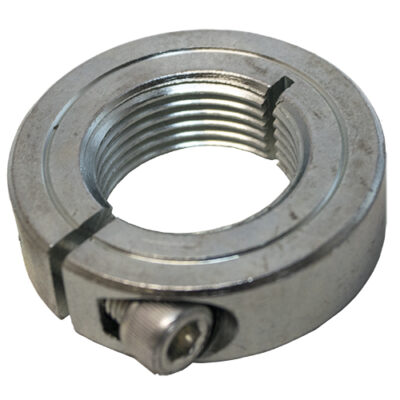
Can you recommend aluminum collars suitable for applications with weight constraints?
Certainly! Aluminum collars are an excellent choice for applications with weight constraints due to their lightweight properties. When selecting aluminum collars for such applications, consider the following recommendations:
- 1. Standard Aluminum Collars: Standard aluminum collars are available in various sizes and styles. These collars are lightweight and suitable for a wide range of applications, especially when weight reduction is a priority.
- 2. Set Screw Collars: Set screw collars, which use a threaded screw to secure the collar to the shaft, are a common choice for lightweight applications. They provide a secure grip without adding significant weight.
- 3. Single Split Collars: Single split collars are designed with a single slit along the circumference of the collar, making them lightweight and easy to install. They are suitable for applications where weight is a concern.
- 4. Precision Machined Collars: Precision machined aluminum collars are designed for high-precision applications. They are lightweight and provide a secure fit for critical components while minimizing added weight.
- 5. Custom Collars: In cases where standard collars do not meet the specific requirements of your application, consider custom aluminum collars. These can be designed and machined to your exact specifications, ensuring they meet weight constraints while fulfilling your needs.
- 6. Corrosion Resistance: Even in weight-constrained applications, it’s essential to consider environmental factors. If the application involves exposure to moisture or corrosive elements, choose aluminum collars with appropriate corrosion resistance to ensure durability.
- 7. Material Thickness: Evaluate the thickness of the collar material. Thicker collars provide additional strength and stability, but they may also add more weight. Balance the need for strength with the weight constraints of your application.
- 8. Weight Reduction Design: Collaborate with collar suppliers who can provide lightweight design solutions. They may offer special lightweight designs that minimize material usage while maintaining structural integrity.
- Consult with Experts: If you’re uncertain about the most suitable aluminum collars for your weight-constrained application, consult with mechanical engineers or collar manufacturers. They can provide expert guidance based on your specific requirements.
When choosing aluminum collars for applications with weight constraints, it’s essential to strike a balance between weight reduction and meeting the mechanical and functional requirements of the application. By considering these recommendations and consulting with experts, you can select the right aluminum collars that meet your needs while adhering to weight limitations.


editor by CX 2023-12-04
China Best Sales Shenzhen CNC Metal Collar Adapter Machining Parts Supplier Customized Brass Stainless Steel Aluminum Collar Adapter electric motor shaft collar
Product Description
HangZhou CNC metal collar adapter machining parts supplier Customized brass stainless steel aluminum collar adapter
Click here and specify your inquiry, contact us to get an online quote now!
How to get a quote?
1. First: Email us and offer your 3D drawing/2D drawing to us to quote.
2. Second: Let us know the required material, surface finish and special tolerance requirements, quantity information, we’ll arrange for our engineer to review your drawings and quote soon!
Note: Workable 3D Drawing Formats: STEP/IGS/X_T/STL/SOLIDWORKS etc, 2D Drawing with PDF will do.
Project Support: Free Sample Offered Before Production starts
Examples projects
What we can offer
| Advantages | »Free sample offered before production »Good machining quality and warm service »Reasonable Pricing and outstanding quality provided »Competitive shipping cost service with discount sometimes »MOQ 1PCS and small quantity order accepted, mass production supported »Professional engineering service when any modification required »Any turnkey assembly or customized package requirements, we’ll meet your demands! |
|||||
| Equipment |
»20 sets of CNC turning machines; »30 sets of the most technologically advanced machining CNC milling machines; »25 sets of Multi-Spindle Japan Precision Swiss CNC lathes |
|||||
| RFQ | Customer Inquiry →Engineering Communication →Cost Analysis →Sales Analysis →Quote to Customer » 1-3 Work Days Only » Submit RFQ with complete commercial terms |
|||||
| Sample Making | Sample Order → Engineering Review → Sample Plan to Customer → Sample Status Tracking → Submit Samples with Doc. » Sample L/T: 1 week » Continuous Sample Status Tracking » Complete Documents for sample approval |
|||||
| Order Management | CRM System → Open Order Confirm → Logistic Arrangement. » Production L/T: 2-4 wks » Weekly Open Order Confirm » Preferred 3PL Service to Customers |
|||||
| Quality Control | Certificates: RoHS, ISO9001:2008, SGS. IQC → IPQC → OQC/FQC → Quality Complain Feedback → Audit & Training. » Plant Audit and Qualified by world famous company » Strict Quality Management Procedure with Traceability |
|||||
| Application | »Aerospace »Automotive »Lighting fittings »Motorbike »PhotoGear »EDC Tools » Marine »Office equipment »Home appliance »Medical equipment »Telecommunication »Electrical & Electronics »Fire detection system, etc. |
|||||
Production information
1). Material Capabilities: Following GB, DIN, and ISO and applying good quality homemade and import materials, we have already provided single/assembly products for international customers mainly from the USA and Europe, etc.
| Stainless Steel | SS201, SS301, SS303, SS304, SS316, SS416 etc. |
| Steel | Mild steel, Carbon steel, 4140, 4340, Q235, Q345B, 20#, 45#, etc. |
| Brass | HPb63, HPb62, HPb61, HPb59, H59, H62, H68, H80 etc. |
| Copper | C11000, C12000, C12000 C36000 etc. |
| Aluminum | AL6061, Al6063, AL6082, AL7075, AL5052, A380 etc. |
| Iron | A36, 45#, 1213, 12L14, 1215 etc. |
| Plastic | ABS, PC, PE, POM, Delrin, Nylon, PP, PEI, Peek etc. |
2). Quality control:
*We have specialized QC testers to check the quality of the products according to different customers’ requirements. Usually, it’s a random inspection, and we also offer 100% inspection at a reasonable price if required.
*We have IQC to check the dimensions and surface of the incoming material
*We have PQC to inspect full-course during the manufacturing processing
*We have FQC to inspect all the anodizing/plating and other finishes’ products from our supplier and proceed with the professional quality and appearance inspection before shipping.
3).Surface Finish: sandblasted/normal and hard anodized finish/polish/coating/polish/passivation/plating/brush/heat treatment/fine glass beads/grounding/tumbled finish , etc. More detailed information for different material parts is below,
|
Aluminum parts |
Brushing Polishing Clear Anodized Color Anodized Sandblast Anodized Chemical Film |
| Stainless Steel parts | Polishing Passivated Sandblasting Plating |
| Steel Parts | Zinc plating Oxide Black Nickel plating Chrome plating Carburized Heat treatment Powder Coated |
| Plastic Parts | Chrome plating Polishing |
4). Payment terms: T/T payment. The Sample order is paid by full payment; Mass production with order amount exceeding can be paid a 50% deposit before production, and balance paid before shipping.
5). Production schedule: Usually, it takes 5~10 working days for sample production; 15~20 working days for mass production days, it depends on your design, simple parts can be produced quickly, the complicated design parts would take us more machining time.
6). Machining capability: 30 sets of the most technologically advanced machining CNC milling machines, 20 sets of CNC turning machines, 25 sets of Multi-Spindle Japan Precision Swiss CNC lathes, and 4 sets of 2D &3D CMM (image measuring instrument) quality control equipment 3 QC staff, enabling CNC Manufacturing to deliver precise parts within the tightest of tolerances, ensuring the highest quality results to meet different
customers’ requirements.
7). Tolerance: +/- 0.02mm (for Metal shaft), +/-0.03mm ( for plastic), for special tolerance requirements, please point them out in the email, we will Check if it’s feasible to make it after studying it.
8). Packing & Shipping way:
1. Packing Detail: Each product is packed with plastic preservative, EPE, foam plastic bag, Carton outside, wood case or iron case or as per the customer’s special requirement. Besides, the custom package takes a week to prepare in advance.
2. Delivery Detail: the fast International Shipping time takes 3 ~5 working days by DHL/UPS/FedEx, slow shipping time takes 7~ 8 working days by DHL/UPS/FedEx/TNT, etc.
3. Shipping options:
1) 0-100kg: express&air freight priority,
2) >100kg: sea freight priority,
3) As per customized specifications
About us
Full-service precision CNC machining services for prototypes and short and low to high production runs. Capabilities are CNC milled and turned metal parts and assemblies. Materials worked with include aluminum, brass, copper, stainless, steel, iron, other precious metals, and other plastic materials. Lead times are 2 to 3 weeks for prototypes and 4 to 6 weeks for production runs. Emergency and rush services are available. Industries served include aircraft and aerospace, consumer electronics, automotive, machinery fittings, audio equipment, EDC tools, computer, and Secondary processes such as anodizing, sandblasting, blackening, grinding, honing, heat treating, powder coating, passivation, polishing, plating, and brushing are also provided.
We put high attention and effort into all of the work that we do. Every part that comes off our machines is an extension of us. We take great pride in bringing machining CZPT to our customers. The amazing quality parts we machined here will be your best choice to find a supplier!
Customer’s comment
Want to know more about us? Email us now!
| After-sales Service: | Email Us Anytime If Any Problems |
|---|---|
| Warranty: | Email Us Anytime If Any Requirements |
| Condition: | New |
| Certification: | CE, RoHS, GS, ISO9001 |
| Standard: | DIN, CE, RoHS, GS, ISO9001 |
| Customized: | Customized |
| Samples: |
US$ 200/Piece
1 Piece(Min.Order) | |
|---|
| Customization: |
Available
| Customized Request |
|---|

What are the temperature resistance properties of aluminum collars?
The temperature resistance properties of aluminum collars are essential to consider when selecting them for various applications. Here’s an overview of their temperature resistance properties:
- 1. Low to Moderate Temperatures: Aluminum collars are suitable for use in low to moderate-temperature environments. They can generally withstand temperatures ranging from -40°C to 150°C (-40°F to 302°F) without significant deformation or loss of strength.
- 2. Melting Point: Aluminum has a relatively low melting point of around 660.3°C (1,220.5°F). This means that in applications where temperatures approach or exceed this point, aluminum collars are not suitable, as they will undergo structural changes.
- 3. Heat Dissipation: Aluminum has excellent heat dissipation properties. This feature is advantageous in applications where temperature control or dissipation is necessary, such as in electronics or heat exchangers.
- 4. Thermal Expansion: Aluminum collars have a coefficient of thermal expansion (CTE) that should be considered. When exposed to temperature changes, aluminum collars will expand or contract. Proper design and clearances are necessary to accommodate this thermal expansion without compromising the application’s performance.
- 5. Insulation: Aluminum is not an electrical insulator. In applications requiring electrical insulation at higher temperatures, alternative collar materials or insulating components should be used to prevent electrical conduction.
- 6. Protective Coatings: To enhance temperature resistance, some aluminum collars are coated with high-temperature-resistant materials. These coatings can extend their usability in higher-temperature environments.
When considering aluminum collars for specific applications, it’s crucial to assess the expected temperature range and the collar’s compatibility with those conditions. For extreme high-temperature applications, alternative collar materials like stainless steel or other heat-resistant materials may be more suitable.
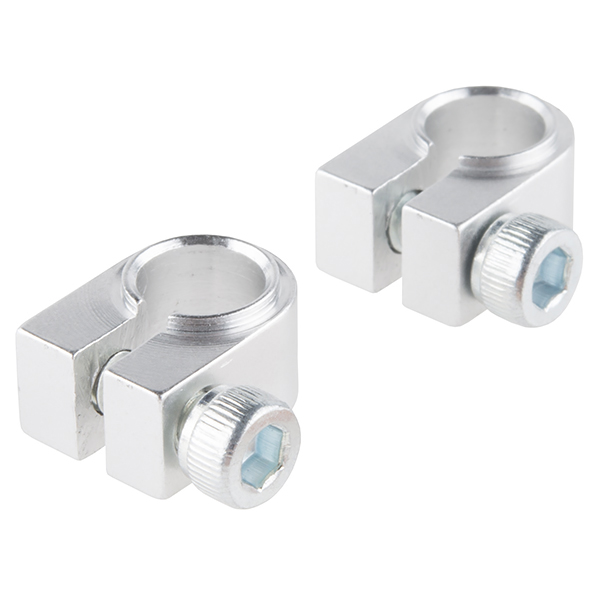
Are there educational resources on alternatives to traditional collars, such as split or set-screw aluminum collars?
Yes, there are educational resources available on alternatives to traditional collars, including split and set-screw aluminum collars. These resources can help you understand the advantages and applications of these alternative collar types. Here’s where to find educational information:
- 1. Manufacturer’s Websites: Visit the websites of collar manufacturers, especially those specializing in aluminum collars. Many manufacturers provide detailed product information, including specifications, features, and application guidelines for various collar types.
- 2. Online Industrial Forums: Online forums and communities dedicated to mechanical components often have sections or discussions related to collar alternatives. You can find user experiences, application examples, and expert opinions on split and set-screw aluminum collars.
- 3. Industrial Supply Catalogs: Industrial supply catalogs often feature educational content on collar alternatives, including their benefits and uses. These catalogs may be available online or in print.
- 4. YouTube Tutorials: Video-sharing platforms like YouTube host tutorials and educational videos on mechanical components. Search for videos specifically related to split or set-screw aluminum collars to gain visual insights into their usage and installation.
- 5. Mechanical Engineering Books: Mechanical engineering textbooks may have sections that discuss various collar types and their applications. These resources provide in-depth knowledge on the topic.
- 6. Manufacturer Webinars: Some collar manufacturers and industrial supply companies conduct webinars and online seminars on the use of collar alternatives. These sessions often feature experts who can answer questions and provide practical insights.
- 7. Collaboration with Engineers: Collaborate with mechanical engineers or professionals in your industry who have experience with collar alternatives. They can provide valuable guidance and share real-world examples of successful applications.
- 8. Trade Associations: Industry-specific trade associations and organizations may offer resources and publications related to collar alternatives. These associations often promote best practices and advancements in mechanical engineering.
- 9. Research Papers and Journals: Academic and industry journals occasionally publish research papers and articles on collar alternatives. These sources can provide in-depth technical knowledge and case studies.
- 10. Supplier Consultation: Contact collar suppliers and consult with their experts. They can provide information about the advantages and applications of split and set-screw aluminum collars, helping you choose the most suitable option for your project.
Exploring these educational resources will provide you with a comprehensive understanding of alternatives to traditional collars and how they can be beneficial for your specific mechanical applications.

What are the key differences between aluminum collars and other collar materials like stainless steel?
Understanding the differences between aluminum collars and other materials like stainless steel is essential when selecting the right collar for your application. Here are the key distinctions:
| Characteristic | Aluminum Collars | Stainless Steel Collars |
|---|---|---|
| Weight | Aluminum collars are lightweight, making them ideal for applications where weight reduction is crucial. | Stainless steel collars are heavier than aluminum collars, which can be advantageous in some high-stress applications. |
| Corrosion Resistance | Aluminum has natural corrosion resistance due to its oxide layer. It’s suitable for indoor and outdoor applications but may not be ideal for highly corrosive environments. | Stainless steel is known for its excellent corrosion resistance, making it suitable for a wide range of applications, including those exposed to harsh chemicals and saltwater. |
| Machinability | Aluminum is relatively easy to machine, making it suitable for custom collar designs. Machining and fabricating aluminum collars is straightforward. | Stainless steel can be more challenging to machine due to its hardness, but it’s still machinable. Special tools and expertise may be required. |
| Strength | Aluminum collars are less strong than stainless steel collars. They are suitable for applications where high strength is not a primary requirement. | Stainless steel collars offer higher strength and durability, making them suitable for high-stress and heavy-load applications. |
| Magnetic Properties | Aluminum is non-magnetic, making it ideal for applications where magnetic interference is a concern. | Stainless steel can be magnetic or non-magnetic, depending on its composition. This property should be considered in applications sensitive to magnetic fields. |
| Cost | Aluminum collars are generally more cost-effective than stainless steel collars, making them a budget-friendly choice. | Stainless steel collars are often more expensive due to their higher material cost and manufacturing complexity. |
The choice between aluminum and stainless steel collars depends on the specific requirements of your application. Consider factors such as weight, corrosion resistance, strength, and budget constraints when making your selection. It’s essential to select the material that best aligns with the needs of your mechanical application.


editor by CX 2023-10-27
China wholesaler Metal Processing Factory Precision Machining Parts Aluminum Stainless Steel Copper Brass Milling Drilling Milling Turnin Machining CNC Parts custom shaft collar
Product Description
We Are Precision Metal Parts Manufacturer And We Providing Custom Processing Service. Send Us Drawings, We Will Feedback You Quotation Within 24 Hours
Precision Parts Display
Click Here Get More Information
Our Advantages
Equipment
3-axis, 4-axis and full 5-axis processing equipment, CNC lathe, centering machine, turning and milling compound, wire cutting, EDM, grinding, etc
Processing
CNC machining, CNC Turning, CNC Milling, Welding, Laser Cutting, Bending, Spinning, Wire Cutting, Stamping, Electric Discharge Machining (EDM), Injection Molding
Materials
Aluminum, metal, steel, metal, plastic, metal, brass, bronze, rubber, ceramic, cast iron, glass, copper, titanium, metal, titanium, steel, carbon fiber, etc
Tolerance
+/-0.01mm, 100% QC quality inspection before delivery, can provide quality inspection form
Quality Assurance
ISO9001:2015, ISO13485:2016, SGS, RoHs, TUV
Tolerance
Surface Treatment
| Aluminum parts | Stainless Steel parts | Steel parts | Brass parts |
| Clear Anodized | Polishing | Zinc Plating | Nickel Plating |
| Color Anodized | Passivating | Oxide black | chrome plating |
| Sandblast Anodized | Sandblasting | Nickel Plating | Electrophoresis black |
| Chemical Film | Laser engraving | Chrome Plating | Oxide black |
| Brushing | Electrophoresis black | Carburized | Powder coated |
| Polishing | Oxide black | Heat treatment |
Machining Workshop
Production Process
Quality Guarantee
Click Here Get Free Quotation
Application industry
CNC Machining Parts Can Be Used in Many Industry
Aerospace/ Marine/ Metro/ Motorbike/ Automotive industries, Instruments & Meters, Office equipments, Home appliance, Medical equipments, Telecommunication, Electrical & Electronics, Fire detection system, etc
Areospace
Cylinder Heads, Turbochargers, Crankshafts, Connecting Rods Pistons, Bearing Caps, CV Joints, Steering Knuckles, Brake Calipers,Gears,Differential Housing, Axle Shafts
Auto&Motorcycle
Cylinder Heads, Turbochargers, Crankshafts, Connecting Rods Pistons,Bearing Caps, CV Joints, Steering Knuckles, Brake Calipers,Gears, Differential Housing, Axle Shafts
Energy
Drill Pipes and Casing, Impellers Casings, Pipe Control Valves, Shafts, Wellhead Equipment, Mud Pumps, Frac Pumps, Frac Tools,Rotor Shafts and disc
Robotics
Custom robotic end-effectors, Low-volume prototype, Pilot, Enclosures, Custom tooling, Fixturing
Medical Industry
Rotary Bearing Seal Rings for CZPT Knife,CT Scanner Frames,Mounting Brackets,Card Retainers for CT Scanners,Cooling Plenums for CT Scanners,Brackets for CT Scanners,Gearbox Components,Actuators,Large Shafts
Home Appliances
Screws, hinges, handles, slides, turntables, pneumatic rods, guide rails, steel drawers
Certifications
FAQ
Q1. What kind of production service do you provide?
CNC machining, CNC Turning, CNC Milling, Welding, Laser Cutting, Bending, Spinning, Wire Cutting, Stamping, Electric Discharge Machining (EDM), Injection Molding, Simple Assembly and Various Metal Surface Treatment.
Q2. How about the lead time?
Mould : 3-5 weeks
Mass production : 3-4 weeks
Q3. How about your quality?
♦Our management and production executed strictly according to ISO9001 : 2008 quality System.
♦We will make the operation instruction once the sample is approval.
♦ We will 100% inspect the products before shipment.
♦If there is quality problem, we will supply the replacement by our shipping cost.
Q4. How long should we take for a quotation?
After receiving detail information we will quote within 24 hours
Q5. What is your quotation element?
Drawing or Sample, Material, finish and Quantity.
Q6. What is your payment term?
Mould : 50% prepaid, 50% after the mould finish, balance after sample approval.
Goods : 50% prepaid, balance T/T before shipment.
| Application: | Fastener, Auto and Motorcycle Accessory, Hardware Tool, Machinery Accessory, Aerospace/ Marine/Automotive/Medical Equipments |
|---|---|
| Standard: | GB, EN, API650, China GB Code, JIS Code, TEMA, ASME |
| Surface Treatment: | Anodizing,Plating,Sandblasting,Polishing,etc |
| Production Type: | Batch Production |
| Machining Method: | Forging |
| Material: | Nylon, Steel, Plastic, Brass, Alloy, Copper, Aluminum, Iron |
| Samples: |
US$ 0.8/Piece
1 Piece(Min.Order) | |
|---|
| Customization: |
Available
| Customized Request |
|---|
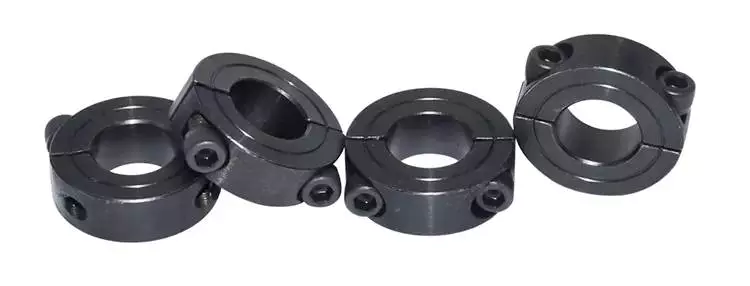
Shaft Collar
A shaft collar is a common machine component that provides mechanical support to shafts. It is found in motors and gearboxes and serves several important functions. Its design makes it an easy component to install. In addition to providing mechanical support to shafts, shaft collars can also serve as locating components and bearing faces.
Sizes
Shaft collars are complex components with several factors that determine their performance. Typical considerations include the style, materials used, bore size, and shaft geometry. Manufacturers typically have information on these factors on their websites. Users can also contact them for advice. These components are available in different sizes and types.
Shaft collars are available in a wide range of sizes, from 1/8 inch to six inches. They can also be re-bored if necessary. There are two main types of shaft collars. The basic one uses set screws, which may mar the shaft. The other type features a clamp screw and a hinge on one side. This eliminates the risk of losing screws.
The most common types of shaft collars are made from steel or aluminum. Plastic shaft collars are lightweight and inexpensive, but have reduced holding power. Steel shaft collars are more durable and hold their shape without bending. They also tend to be corrosion resistant. The steel grades used can have a big impact on their performance. For example, the 12L14 alloy is easier to machine, but does not do well in welding applications. Stainless steel shaft collars offer enhanced corrosion resistance, but reduced holding power. They are most commonly made from 304 stainless steel.
Shaft collars are an integral part of many mechanical systems. They are used to mount shafts onto flat surfaces and hold mechanical components in place. These accessories are available in a wide range of sizes and styles. Depending on the application, a shaft collar can be made to fit virtually any shaft.
The material used for shaft collars is also an important factor. The material of the shaft collar can make a big difference in the performance of the collar. The screw can be either flat or hex. The material will also determine the holding power. A screw with a hardened center will provide better holding power.
Another factor affecting the holding power of shaft collars is its surface treatment. The most common types are steel, black oxide, and zinc-plated. The latter is beneficial as it reduces the friction coefficient and enhances the holding power. Zinc-plated collars are better corrosion resistant than black oxide. However, the black oxide treatment is more effective because it prevents slippage.
Construction
Shaft collar construction involves the construction of a collar around an underground shaft. This structure consists of steel casing and concrete that extends below the surface of the ground. The concrete may be constructed using conventional or specialty cements. It may also contain accelerators and other additives to improve its holding strength. The concrete may also contain heavyweight or lightweight aggregates for optimal properties.
There are two main types of shaft collars. The double split collar is the most common type. It has a split design in the middle and is fastened using two allen head cap screws on each side. It has greater holding power than a solid collar, and the two-piece design makes it easier to install and replace. In addition, double split collars don’t require disassembling the entire shaft and its components.
There are many factors to consider when selecting a shaft collar. The material, holding power, and surface treatment of the shaft collar will affect its ability to withstand the load without slipping. These factors must match the specifications of the application in order to maximize its safety. A guide can help you choose the most appropriate shaft collar for your needs. The holding power of a shaft collar depends on the material used for construction and the screw size.
Shaft collars are used for a variety of applications that require a secure grip on mechanical components. They can be used on shafts, tubes, piping, and even flat surfaces. Only the highest quality collars are approved for use in industrial settings. These collars help ensure proper alignment of mechanical components and prevent any unnecessary movement. There are three different types of shaft collars. One type is a two-piece collar that is held together by two socket head screws.
Shaft collars may include an extended concrete pad at the surface. This concrete pad can support surface equipment and piping support assemblies. The shaft collar extends below temporary bracing material and within the retainment wall. The extended portion of the collar is then extended into the competent rock. From there, the collar transitions to a shaft lining assembly.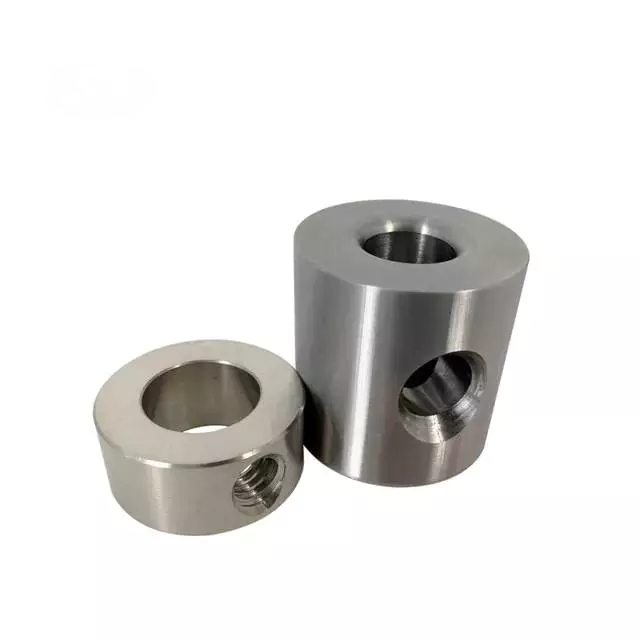
Functions
A shaft collar is a simple device that plays a critical role in a wide variety of industrial applications. Its primary functions are to hold components in place, locate components on the shaft, and form an attachment between a shaft and another component. In designing a shaft collar, a designer needs to consider several factors, including the material, bore size, and geometry of the shaft. It is also important to consider the specific requirements of the system.
Threaded collars are superior to smooth-bore collars in many ways. Threaded collars are more resistant to axial loads than smooth-bore collars, which rely on friction. Because the collar and shaft are threaded, they are practically impossible to move axially without breaking the shaft.
There are many types of shaft collars, each with their own unique properties. Each collar has different applications, and its performance must match the needs of the application. For many applications, holding power is paramount, while other performance factors include weldability, inertia, conductivity, corrosion resistance, and precision of collar-face relative to the bore.
While shaft collars may exert some holding force, they also exert other forces on the shaft. For example, they are ideal for splitting hubs, where they act as interfaces between various components. In addition, their close tolerances allow them to exert minimal force on the hub. This allows them to provide increased holding power while minimizing the force needed to close the hub.
Despite their simplicity, the shaft collar plays a crucial role in machine design. They hold components in place and provide necessary positioning for power transmission. Additionally, they are used as spacers in motor assemblies. And, they can also act as mechanical stops, limiting the movement of the shaft. You can find them in virtually any type of machinery.
Another type of shaft collar is the threaded collar, which can be axially or radially attached to the shaft. Its design has an internal thread that helps to precisely position it along the shaft. Internal threads also offer enhanced support for high axial loads. Internal threads also act as a positive mechanical stop.
Applications
Shaft collars are used in a variety of industrial applications. They serve as accurate stops and easy-to-adjust spacers. They can be used on glass, thin-wall tubing, and plastic. Other applications include optical measuring instruments and positioning systems for MRI machines. These collars are available in different sizes, materials, and styles.
The material used for shaft collars can have a significant impact on their performance. A collar’s holding power is also affected by the strength of its screw. Generally, a collar manufacturer will provide a screw that is compatible with the application. However, in some cases, it is necessary to use a nonstandard screw.
The clamp-style collar is reliable under constant loads, but it may need extra support when shock loads are present. In these situations, a small mass is impacted, and high forces are created. A positive stop can help a clamp-style collar stay in place during such shock loads. Alternatively, a collar undercut on a shaft can provide positive stops in both axial directions.
There are many different shaft collar designs and styles. Choose the right one for your application by considering your specifications. Different styles have different purposes, so consider the type and material that is right for your application. Some manufacturers offer a variety of different styles to choose from. You can visit their website or call their customer service representatives for assistance. This way, you can choose the best shaft collar for your specific needs. These collars are a very important part of many mechanical systems.
Clamp-style collars are an excellent choice when axial adjustment along the shaft is required frequently. These collars are easy to install and remove and do not mar the shaft. In addition, they provide excellent clamping force and impressive holding power. Quick-clamp collars are also a great choice for light-duty applications. They allow for fast and easy adjustment and are particularly useful in packaging and printing industries.
Shaft collars are composed of two components: a central bore and a second component. The first component is preferably made of resilient elastomeric material. The second component is made of a plastic material and has a relative stiffness that helps the shaft collar slide on a shaft without causing too much stress.

editor by CX 2023-06-08
China Custom Precision Carbon Steel Parts CNC Machining Metal Pipe Shaft Collar Bushing Stainless Steel Sleeve Bushing axle collar bearing
Solution Description
Custom Precision Carbon Steel Areas CNC Machining Metal Pipe Shaft Collar Bushing
Stainless Metal Sleeve Bushing
| Content | 1) Aluminum: AL 6061-T6, 6063, 7075-T and so forth. |
| 2) Stainless steel: 303, 304, 316L, seventeen-4(SUS630) and so on. | |
| 3) Metal: 4140, Q235, Q345B, 20#, 45# and so on. | |
| 4) Titanium: TA1, TA2/GR2, TA4/GR5, TC4, TC18 and many others. | |
| 5) Brass: C36000 (HPb62), C37700 (HPb59), C26800 (H68), C22000(H90) and so forth. | |
| 6) Copper, Bronze, Magnesium alloy, Delrin, POM, Acrylic, Personal computer, and so forth. | |
| Finsh | Sandblasting, Anodize color, Blackenning, Zinc/Nickl Plating, Polish. |
| Power coating, Passivation PVD, Titanium Plating, Electrogalvanizing. | |
| Electroplating chromium, Electrophoresis, QPQ(Quench-Polish-Quench). | |
| Electro Polishing, Chrome Plating, Knurl, Laser etch Brand, etc. | |
| Major Equipment | CNC machining middle(Milling), CNC Lathe, Grinding equipment. |
| Cylindrical grinder device, Drilling device, Laser reducing device, and many others. | |
| Drawing structure | STEP, STP, GIS, CAD, PDF, DWG, DXF and many others or samples. |
| Tolerance | +/-.01mm ~ +/-.05mm |
| Surface roughness | Ra .1~3.two |
| Inspection | Complete inspection lab with Micrometer, Optical Comparator, Caliper Vernier, CMM. |
| Depth Caliper Vernier, Common Protractor, Clock Gauge, Inside Centigrade Gauge. | |
| Capacity | CNC turning function selection: φ0.5mm-φ150mm*300mm. |
| CNC milling function range: 510mm*1571mm*500mm. |
About Runsom
Runsom, a business specializing in fast prototyping and manufacturing, has a long time of experience in
CNC machining, 3D printing, injection molding, sheet metallic fabrication, and die casting. Our engineering
crew with extensive knowledge and expertise makes use of the most recent prototyping systems and leading-notch
machining gear to offer extensive providers to fulfill worldwide customers’ requirements,
timescales, and particular wants. We are CZPT to take your ideas or patterns to fact production in just
times with our innovative machining technologies, substantial production experience, and a wealth of
high quality components.
Our Mission
Runsom Precision was recognized to give support to companies in the industries fields who regularly
want to reduce their fees and satisfy restricted deadlines. Our objective is to make sure consumer satisfaction by
offering initial-course venture administration control and difficulty-free products.
Get a Quotation
Q1: What is actually varieties of data you require for quote?
A1: Kindly please offer the 2nd/3D drawings (PDF/DWG/DXF/IGS/STP/SLDPRT/etc) and advise materials
, finish, amount for quoting.
Q2: What is your MOQ?
A2: MOQ is dependent on our client’s wants, besides, we welcome demo order just before mass-generation.
Q3: What is the lead time?
A3: Dependent on your particular project and quantity.
Q4: Obtainable for custom-made design drawings?
A4: Yes, you should ship the specialized drawings to us. It really is greater if you can deliver the two 2d and 3D drawings if
you have.
Q5: If the areas we obtain from your firm are not good, what can we do?
A5: Please feel free of charge to get in touch with us after you got the merchandise. Kindly send out us some photographs, we will
comments to our engineers and QC departments and remedy the difficulties ASAP.
Q6: Are you a manufacturer or investing business?
A6: We are a manufacturer, we are situated in HangZhou, China.
Q7: Will my drawings be secure after sending to you?
A7: Yes, we will hold them properly and not release to 3rd celebration with no your permission.
|
US $1-10 / Piece | |
5 Pieces (Min. Order) |
###
| After-sales Service: | Negotiation |
|---|---|
| Warranty: | Negotiation |
| Condition: | New |
| Certification: | CE, RoHS, GS, ISO9001 |
| Standard: | DIN, ASTM, GOST, GB, JIS, ANSI, BS |
| Customized: | Customized |
###
| Samples: |
US$ 5/Piece
1 Piece(Min.Order) |
|---|
###
| Customization: |
Available
|
|---|
###
| Material | 1) Aluminum: AL 6061-T6, 6063, 7075-T etc. |
| 2) Stainless steel: 303, 304, 316L, 17-4(SUS630) etc. | |
| 3) Steel: 4140, Q235, Q345B, 20#, 45# etc. | |
| 4) Titanium: TA1, TA2/GR2, TA4/GR5, TC4, TC18 etc. | |
| 5) Brass: C36000 (HPb62), C37700 (HPb59), C26800 (H68), C22000(H90) etc. | |
| 6) Copper, Bronze, Magnesium alloy, Delrin, POM, Acrylic, PC, etc. | |
| Finsh | Sandblasting, Anodize color, Blackenning, Zinc/Nickl Plating, Polish. |
| Power coating, Passivation PVD, Titanium Plating, Electrogalvanizing. | |
| Electroplating chromium, Electrophoresis, QPQ(Quench-Polish-Quench). | |
| Electro Polishing, Chrome Plating, Knurl, Laser etch Logo, etc. | |
| Main Equipment | CNC machining center(Milling), CNC Lathe, Grinding machine. |
| Cylindrical grinder machine, Drilling machine, Laser cutting machine, etc. | |
| Drawing format | STEP, STP, GIS, CAD, PDF, DWG, DXF etc or samples. |
| Tolerance | +/-0.01mm ~ +/-0.05mm |
| Surface roughness | Ra 0.1~3.2 |
| Inspection | Complete inspection lab with Micrometer, Optical Comparator, Caliper Vernier, CMM. |
| Depth Caliper Vernier, Universal Protractor, Clock Gauge, Internal Centigrade Gauge. | |
| Capacity | CNC turning work range: φ0.5mm-φ150mm*300mm. |
| CNC milling work range: 510mm*1020mm*500mm. |
|
US $1-10 / Piece | |
5 Pieces (Min. Order) |
###
| After-sales Service: | Negotiation |
|---|---|
| Warranty: | Negotiation |
| Condition: | New |
| Certification: | CE, RoHS, GS, ISO9001 |
| Standard: | DIN, ASTM, GOST, GB, JIS, ANSI, BS |
| Customized: | Customized |
###
| Samples: |
US$ 5/Piece
1 Piece(Min.Order) |
|---|
###
| Customization: |
Available
|
|---|
###
| Material | 1) Aluminum: AL 6061-T6, 6063, 7075-T etc. |
| 2) Stainless steel: 303, 304, 316L, 17-4(SUS630) etc. | |
| 3) Steel: 4140, Q235, Q345B, 20#, 45# etc. | |
| 4) Titanium: TA1, TA2/GR2, TA4/GR5, TC4, TC18 etc. | |
| 5) Brass: C36000 (HPb62), C37700 (HPb59), C26800 (H68), C22000(H90) etc. | |
| 6) Copper, Bronze, Magnesium alloy, Delrin, POM, Acrylic, PC, etc. | |
| Finsh | Sandblasting, Anodize color, Blackenning, Zinc/Nickl Plating, Polish. |
| Power coating, Passivation PVD, Titanium Plating, Electrogalvanizing. | |
| Electroplating chromium, Electrophoresis, QPQ(Quench-Polish-Quench). | |
| Electro Polishing, Chrome Plating, Knurl, Laser etch Logo, etc. | |
| Main Equipment | CNC machining center(Milling), CNC Lathe, Grinding machine. |
| Cylindrical grinder machine, Drilling machine, Laser cutting machine, etc. | |
| Drawing format | STEP, STP, GIS, CAD, PDF, DWG, DXF etc or samples. |
| Tolerance | +/-0.01mm ~ +/-0.05mm |
| Surface roughness | Ra 0.1~3.2 |
| Inspection | Complete inspection lab with Micrometer, Optical Comparator, Caliper Vernier, CMM. |
| Depth Caliper Vernier, Universal Protractor, Clock Gauge, Internal Centigrade Gauge. | |
| Capacity | CNC turning work range: φ0.5mm-φ150mm*300mm. |
| CNC milling work range: 510mm*1020mm*500mm. |
Types of Shaft Collars
A shaft collar is a simple machine component that plays a critical role in power transmission. It is typically found in gearboxes and motors, and serves as a bearing face, mechanical stop, and locating component. Its simple design makes it easy to install and use. Its various functions make it a useful machine part for many applications.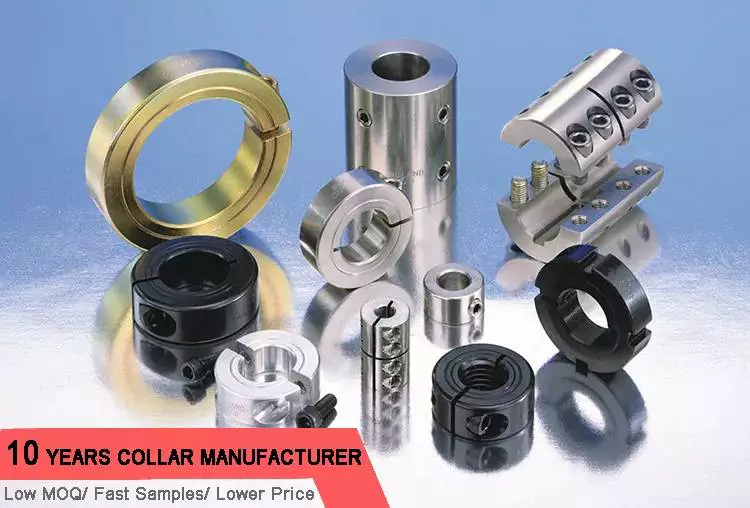
Set screw shaft collars
Set screw shaft collars are used in many different applications and can be manufactured in a variety of materials. Typical materials include carbon steel, stainless steel, platinum, silver, nylon, polysulphone, PTFE, and PVC. Collars are easy to install and adjust. A variety of secondary services are available, including internal forming, chroming, and passivating.
Set screw shaft collars come in different styles, including standard collars, quick-release collars, split collars, and threaded collars. They can be purchased in standard and metric sizes, and are available in a variety of finishes. Standard collars are available in steel and stainless steel and have a zinc plated or black oxide finish.
Set screw shaft collars are an excellent choice for holding power transmission components in place and limiting shaft movement. They are held in place by a set screw that digs into the shaft material, providing holding power. They are available in both 303 and 316 Stainless Steel, making them a reliable and efficient choice for a variety of applications.
Clamping-style shaft collars
Clamp-style shaft collars are a versatile alternative to set-screw collars. They eliminate the problems associated with the set-screw collar, such as the possibility of shaft damage. They also lock in place by compressing against the shaft. This method distributes the force on the collar and shaft evenly, creating a stronger holding power.
Shaft collars are manufactured by many companies. You can buy them in-store or online, but it is important to buy from a reputable manufacturer. Many counterfeit collars endanger the life of your machine. Choosing a quality collar will help you avoid costly and time-consuming machine breakdowns.
Clamping-style shaft collars come in a variety of sizes and types. Some of them have a hex or D-bore. Some have circular grooves to assist with installation. They can be found in bore sizes from 1/4″ to one inch. They are often used for mounting gears, sprockets, and bearings.
Two-piece clamp collars are an excellent choice for high-load applications. They have improved clamping force and impressive holding power, and can be easily installed without major disassembly. Two-piece clamp collars can also be designed with a keyway to secure a keyed shaft. There are also special double-wide clamp collars for high axial load applications.
Another type of shaft collar is the quick clamping collar. It is an excellent choice for applications where you want to make frequent setup and adjustments. It allows for easy adjustments with minimal tools. Quick clamping collars feature a cam lever and a clamping lever. They are convenient and highly flexible, making them ideal for use in many industries.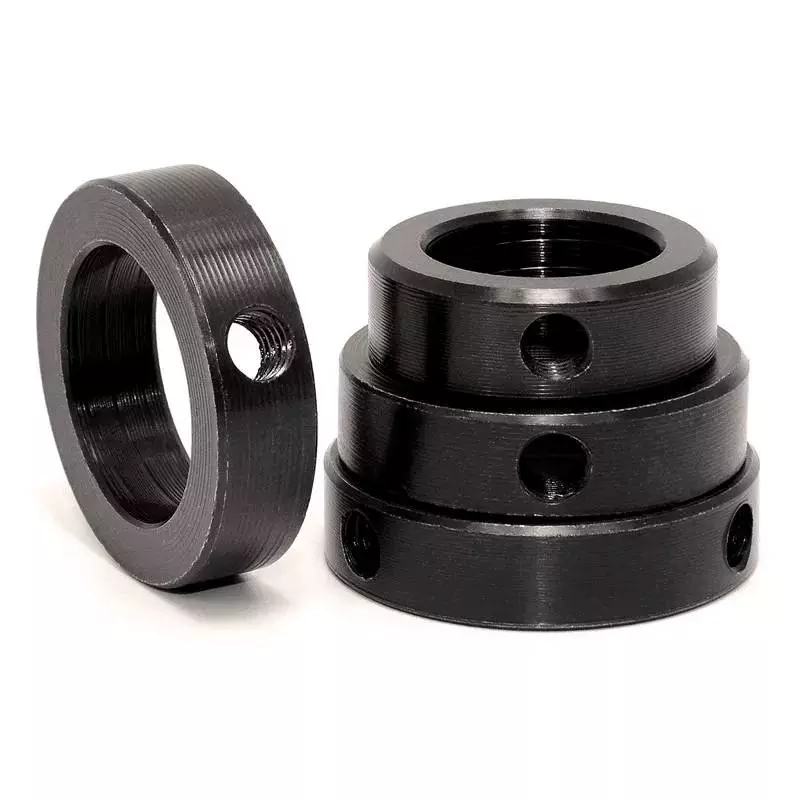
Single split shaft collars
A single split shaft collar is designed to fit one shaft and eliminate two pieces. This makes installation and disassembly easy, reducing labor and downtime. It also uses a full seating torque of the set screws to distribute forces evenly around the shaft circumference, providing stronger holding power. It can be used on a wide range of rotating equipment.
Single split shaft collars are available from CZPT Products. They are a common, high-quality way to secure a shaft. They wrap around the shaft for a secure and tight fit. They are also a versatile option that can be easily removed. These collars can be used on both hard and soft standard round shafts. They provide superior grip compared to solid collars, provide tremendous axial force, and minimize shaft distortion.
Single split shaft collars are one of the many types of bearing shaft locking collars. They are made of EN8 steel, and come with a locking setscrew. This makes installing the collar quick and easy. The collar is available in many sizes, including small, medium, and large. If you do not find the right fit, you can also have one custom-made.
These collars are commonly used for mounting fixtures, sensors, and other assemblies. They are available in two-piece and one-piece styles, and have higher holding power than standard shaft collars. They are available in a wide range of materials, including 1215 lead-free steel, 303 stainless steel, and lightweight 2024 aluminum.
Aluminum shaft collars
The CZPT company produces Aluminum shaft collars for a variety of applications. These shaft collars feature a proprietary manufacturing process to ensure accurate face-to-bore perpendicularity. This helps to improve clamping forces and installation fit. Each collar features the CZPT name stamped on it, and the collar is finished with a black oxide process to achieve a fine glossy finish. The shaft collars are available in a variety of bore sizes and styles, and can be ordered in single or two-piece styles. Additionally, they are manufactured with a high-grade forged screw, which ensures the highest quality.
Aluminum shaft collars can be customized to fit your needs. Several accessories can be added to the shaft collar, such as steel mending plates. Those who need extra load capacity can select a keyed shaft collar. They are also available in lightweight styles. These shaft collars are easy to install and disassemble, and are made from two-piece aluminum for ease of installation.
Choosing the right shaft collar material is critical to the success of your application. You should consider steel, stainless steel, or aluminum for the best corrosion resistance. Steel is stronger and offers better holding power, while aluminum offers a lower weight and a favorable strength-to-weight ratio. When selecting shaft collars, it is important to take into consideration the corrosion resistance of each material. For example, carbon steel shaft collars will not be as corrosion resistant as aluminum shaft collars, but they are lighter and have a good hold power.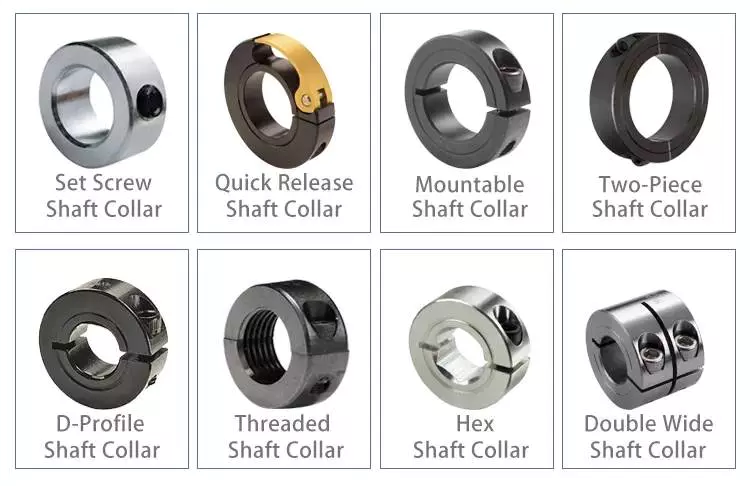
Carbon steel shaft collars
Carbon steel shaft collars are a versatile solution to holding bearings in place. They are available in a range of diameters and styles to meet your application needs. They can be used for many different applications, from aerospace and military applications to marine and automotive applications. These collars are available in a variety of materials, including carbon steel, aluminum, and stainless steel.
Carbon steel shaft collars are a cost-effective alternative to stainless steel shaft collars. CZPT manufactures lead-free carbon steel shaft collars, and they are also available with RoHS-compliant yellow zinc plating. Zinc plating is less expensive than stainless steel and is an excellent anti-corrosive option. CZPT yellow zinc collars are plated by a trivalent process rather than a non-compliant hexavalent process.
Shaft collars are available in both metric and inch bore sizes. They can be used for a variety of applications and are typically available in sizes ranging from 1/4″ to three inches. They are also available with metric screws in a range of sizes, which are useful for retrofitting equipment.
Shaft collars are available in a variety of materials, including carbon steel, 303 stainless steel, and aluminum. Some options feature threads and can be welded or bolted to shafts. For more advanced applications, aluminum threaded shaft collars can be used. They are often used for mounting sensors, fixtures, and other assemblies. They come in several styles, such as double-wide, heavy-duty, and threaded.
Hinge shaft collars
Hinge shaft collars are fastening devices that secure shafts or axles. They come in a wide range of sizes, shapes, and materials. These collars can be used in a wide range of applications, including non-rotary applications. They can be manufactured in stainless steel, 1018 steel, aluminum, and brass.
Shaft collars are simple to use but can perform a variety of functions. Their primary functions include holding components in place, locating components on a shaft, and establishing attachment between the shaft and another component. To choose the right collars for a specific application, designers should consider the design, style, materials, bore size, and geometry of the shaft. They should also consider any limitations or requirements associated with the application.
Hinge shaft collars are available in round and square bores. They are most commonly used in agricultural applications. Their size makes them easy to install, and their design makes them suitable for both large and small shafts. They are also used in situations where shafts are not easily accessible. Some types of shaft collars feature flat surfaces, which are great for mounting applications and splitting hubs.
Heavy duty shaft collars are also available. These collars have larger outer diameters, wider bores, and larger screw diameters. They are manufactured from lead-free steel with a proprietary black oxide finish.

editor by czh 2023-01-15
China Made in China Steel Sleeve Self Lubricating Oilless Metal PTFE Bush Oil Sliding Pap Bearing Bushing shaft collar dimensions
Item Description
Item Description
|
Company Profile
HangZhou Xihu (West Lake) Dis. Machinery Manufacture Co., Ltd., situated in HangZhou, “China’s historical copper funds”, is a “national large-tech business”. At the beginning of its institution, the business adhering to the “to provide customers with large good quality products, to give well timed provider” notion, adhere to the “every thing for the client, make customer exceptional provider” for the mission.
Certifications
Q: Exactly where is your company located ?
A: HangZhou ZheJiang .
Q: How could l get a sample?
A: Prior to we received the 1st get, you should find the money for the sample value and specific price. we will return the sample value back
to you within your initial get.
Q: Sample time?
A: Current items: in 20-60 days.
Q: Whether you could make our brand on your items?
A: Sure. We can print your Symbol on the two the products and the packages if you can meet up with our MOQ.
Q: How to ensure the high quality of your goods?
A: 1) stict detection during creation. 2) Strict entirely inspecion on items before cargo and intact product
packaging ensured.
Q: lf my drawings are protected?
A: Yes ,we can indication NDA.
|
US $10-150 / Piece | |
5 Pieces (Min. Order) |
###
| After-sales Service: | Have |
|---|---|
| Warranty: | 1 Year |
| Type: | OEM/ODM/Customized |
| Application: | OEM/ODM/Customized |
| Certification: | ISO9001: 2000 |
| Condition: | New |
###
| Customization: |
Available
|
|---|
###
###
###
###
|
